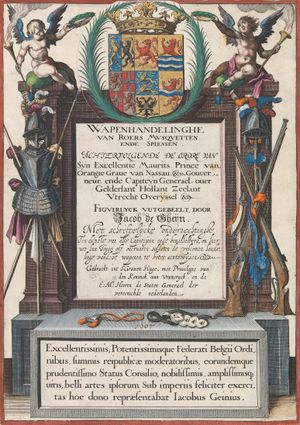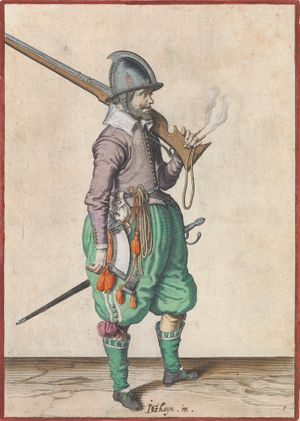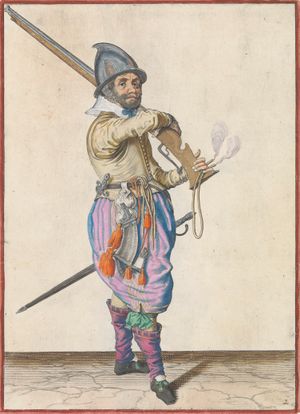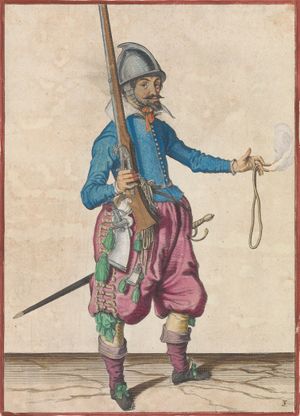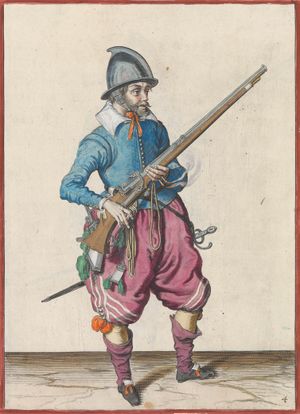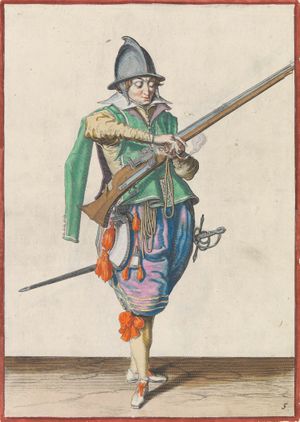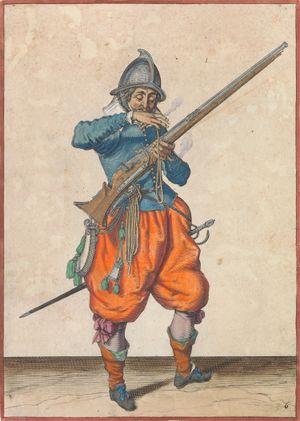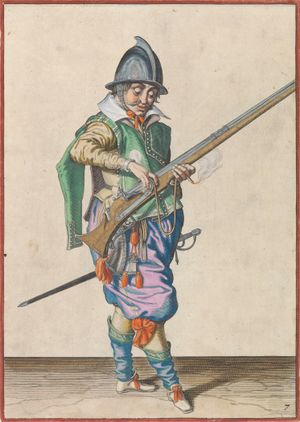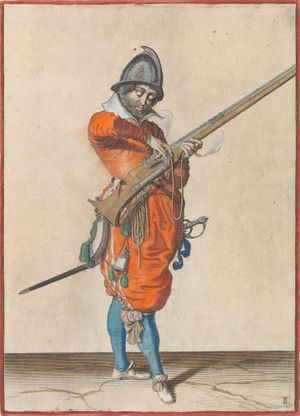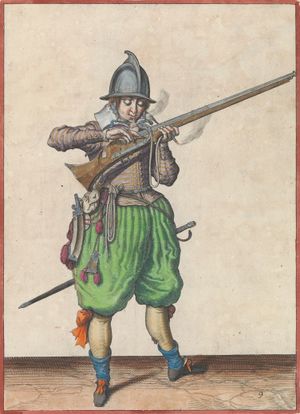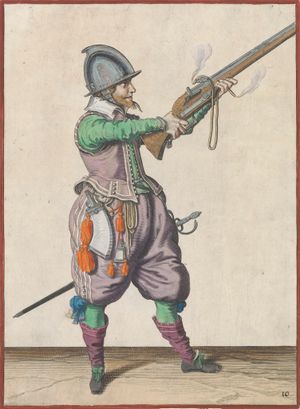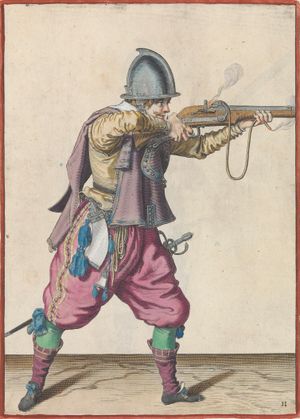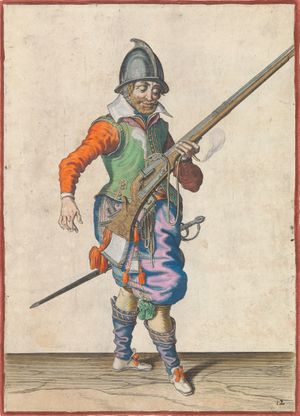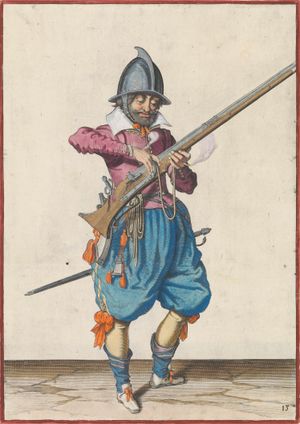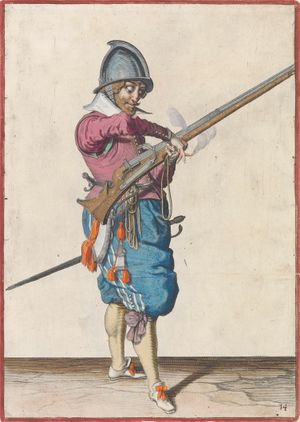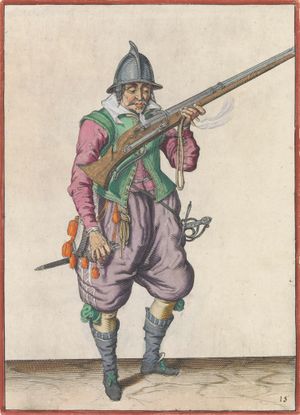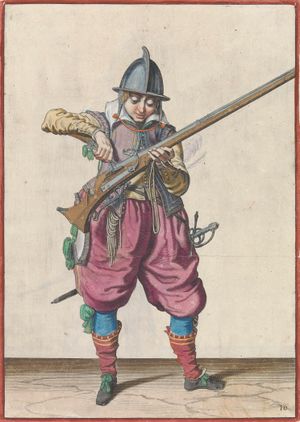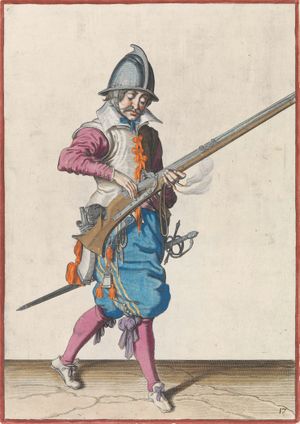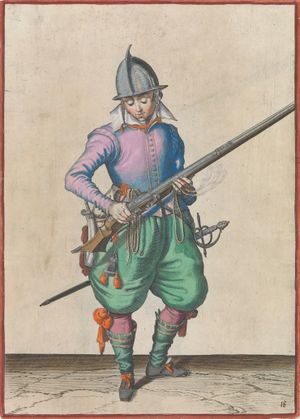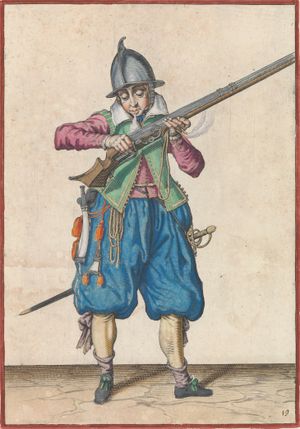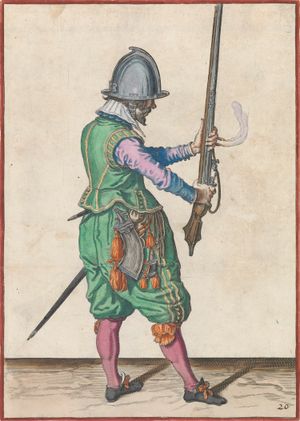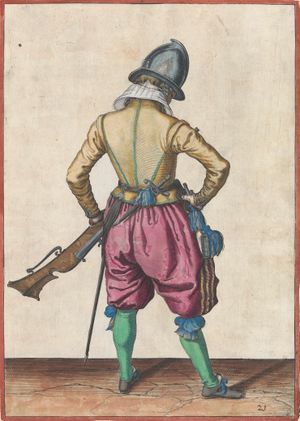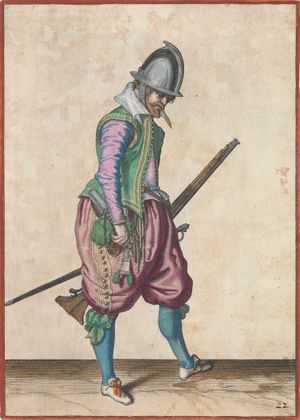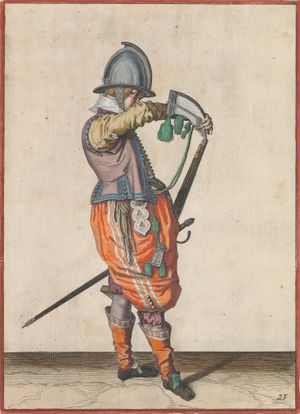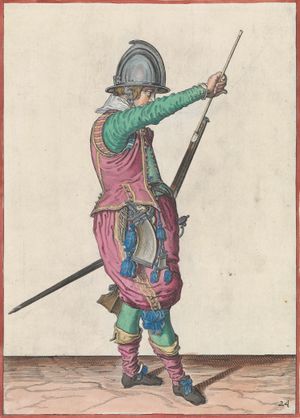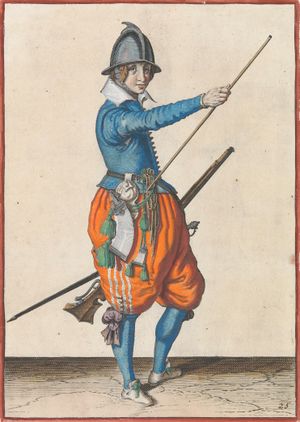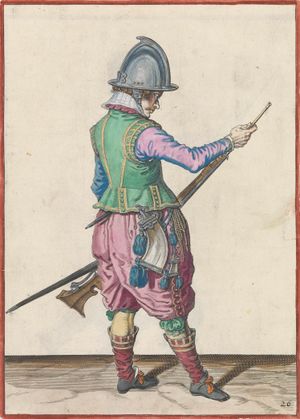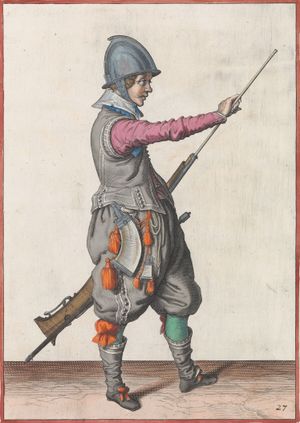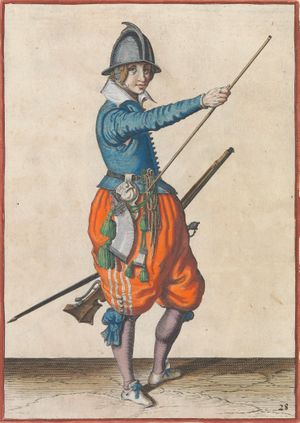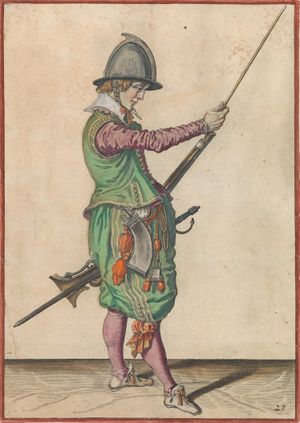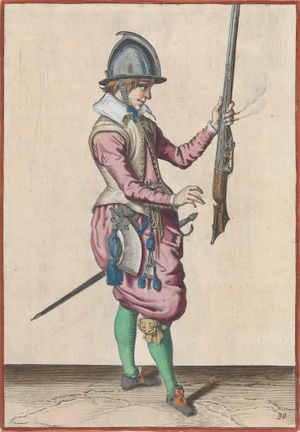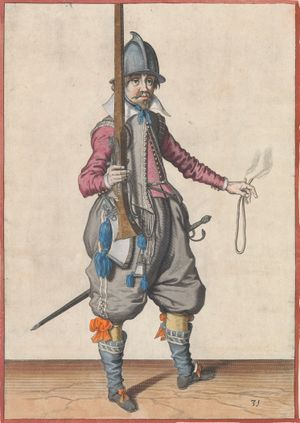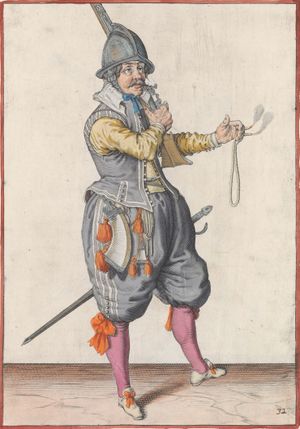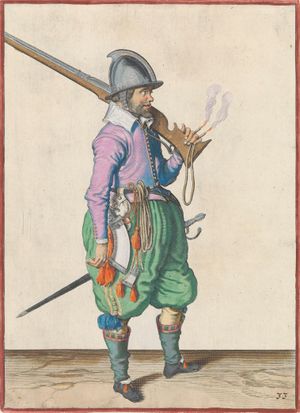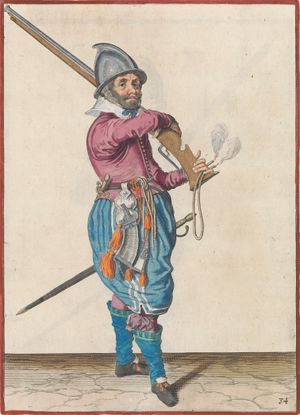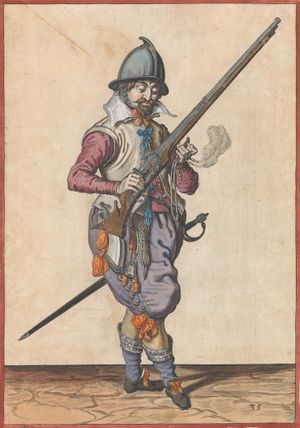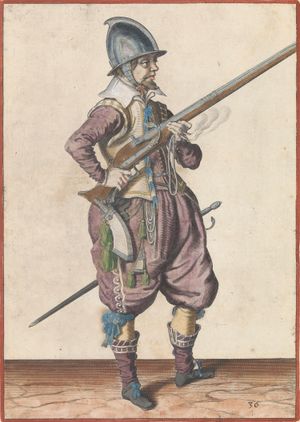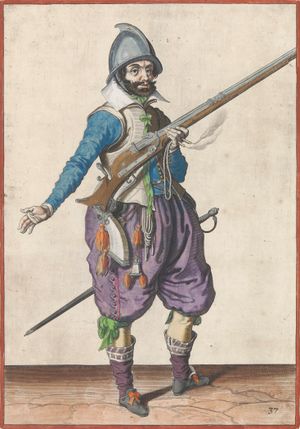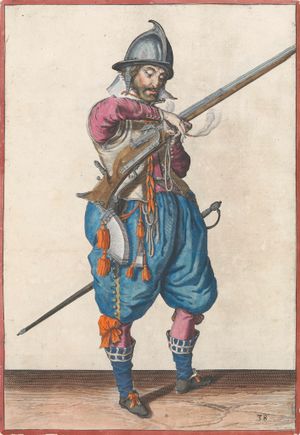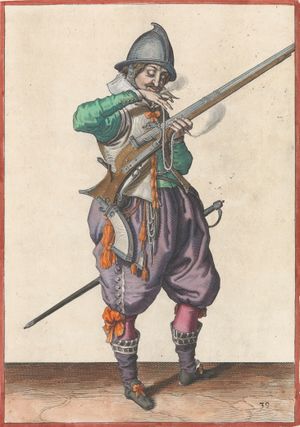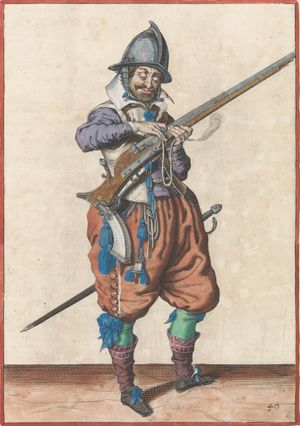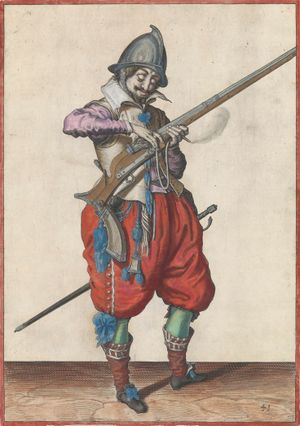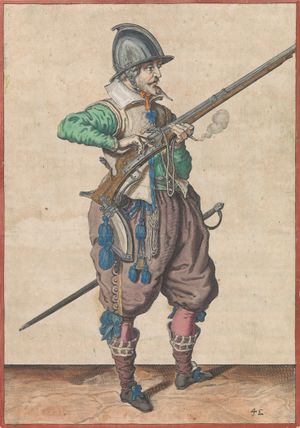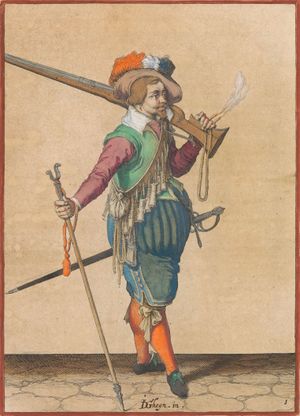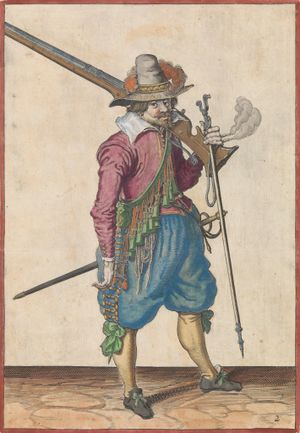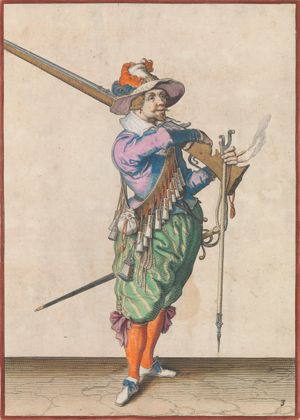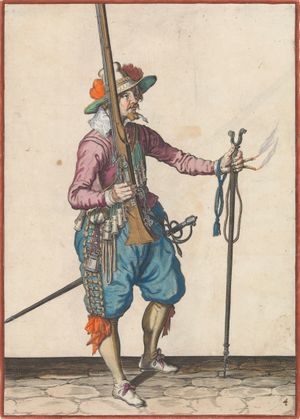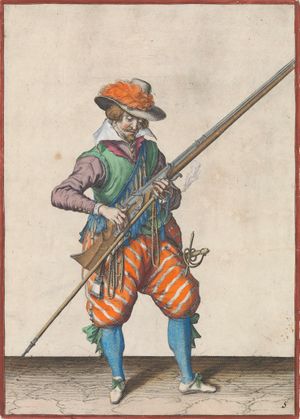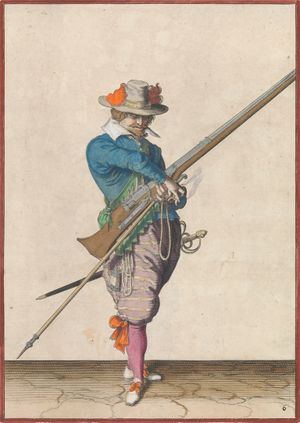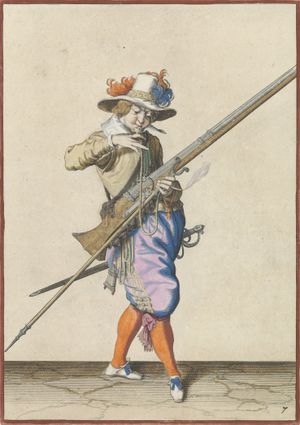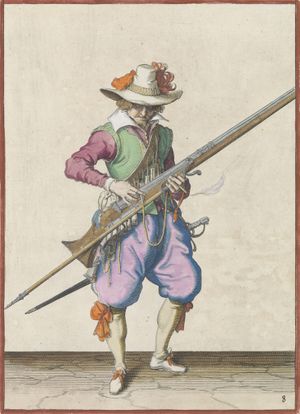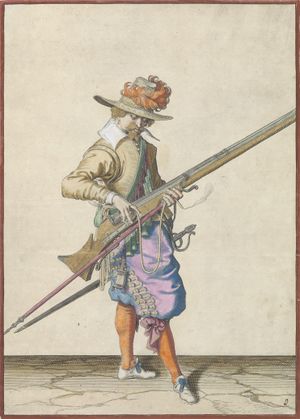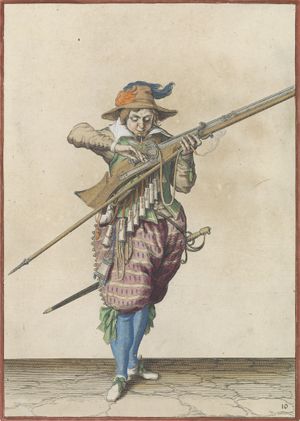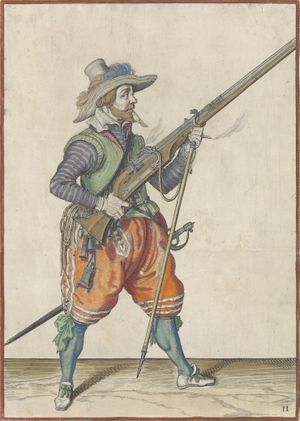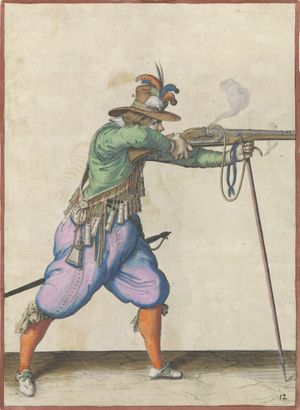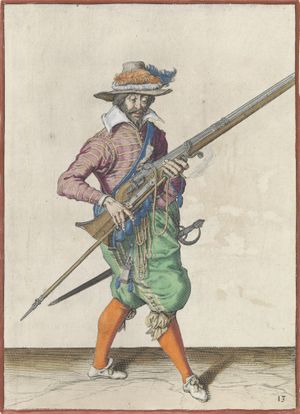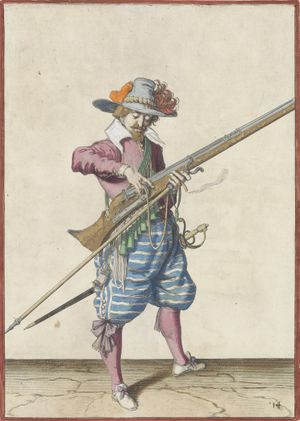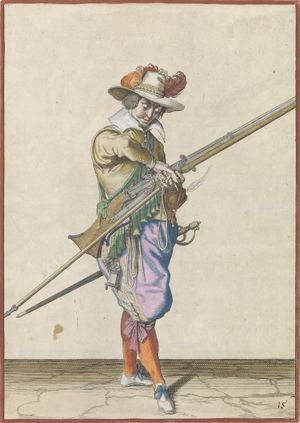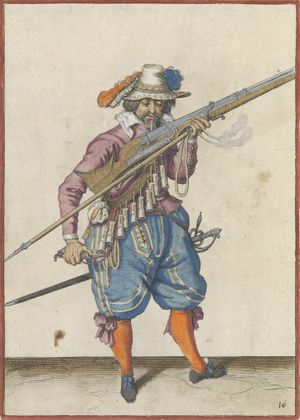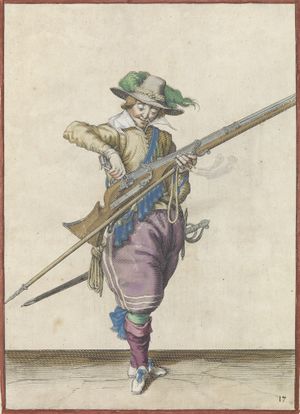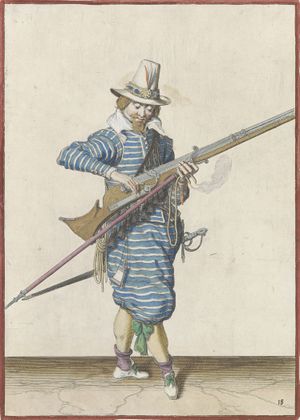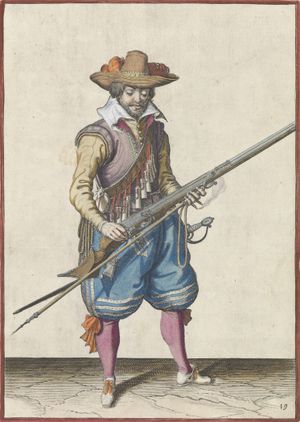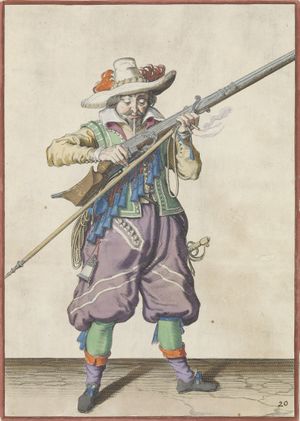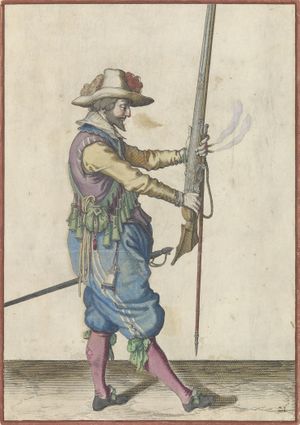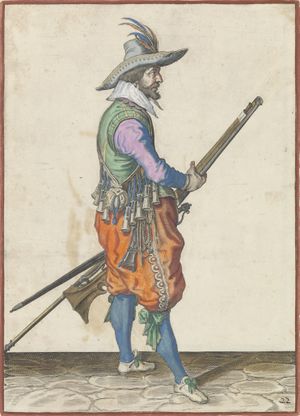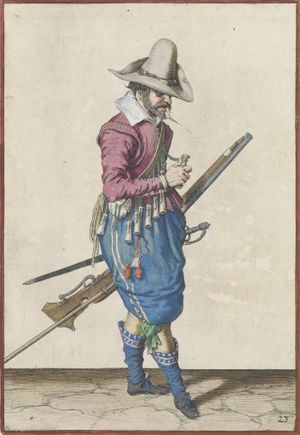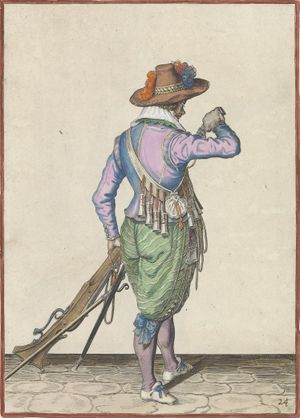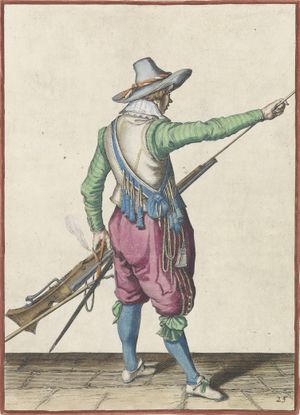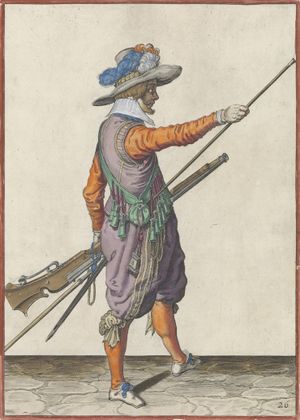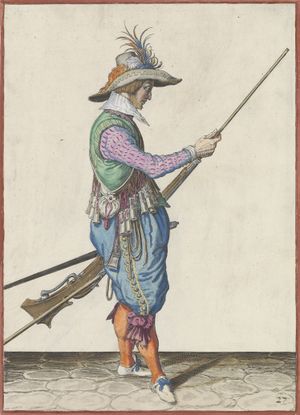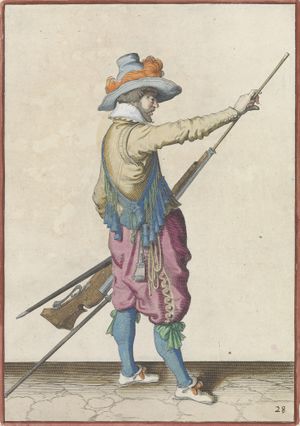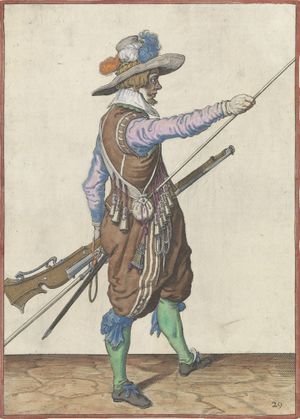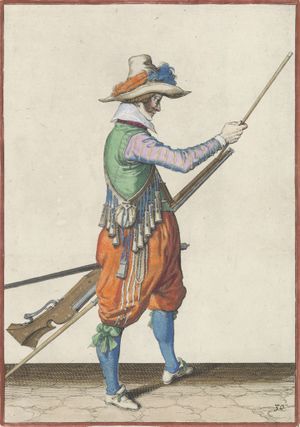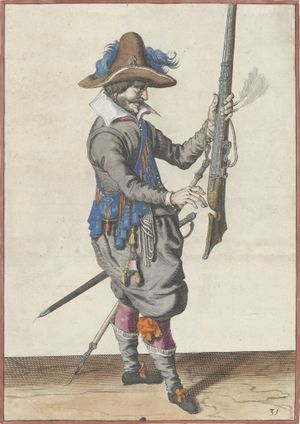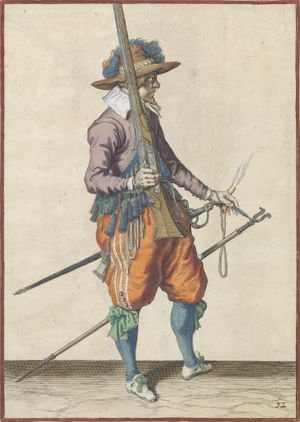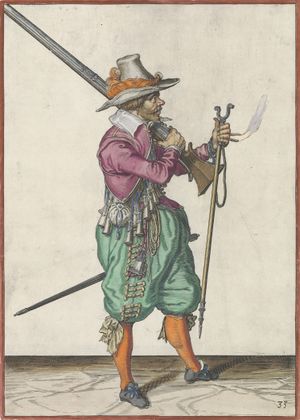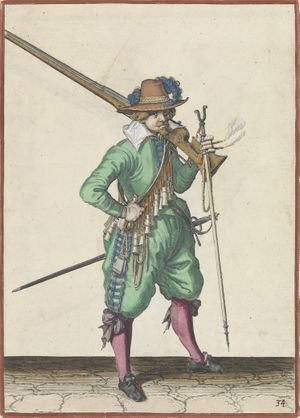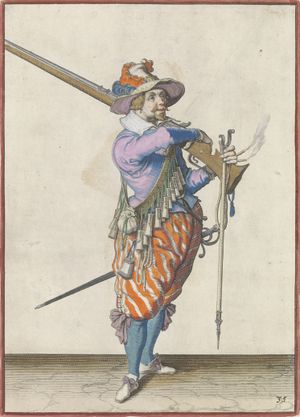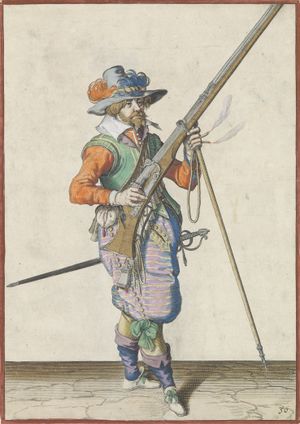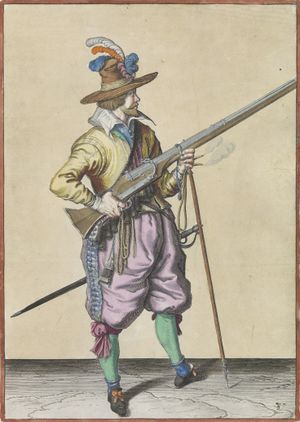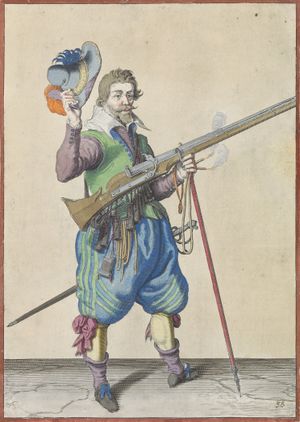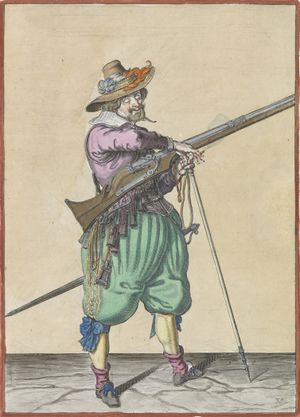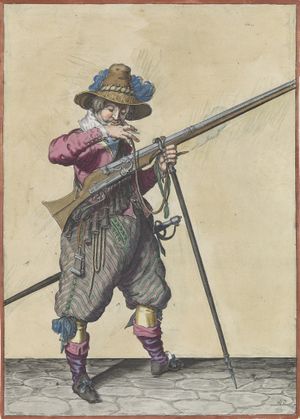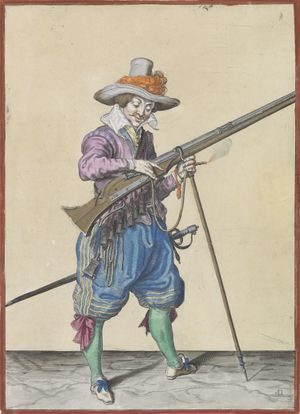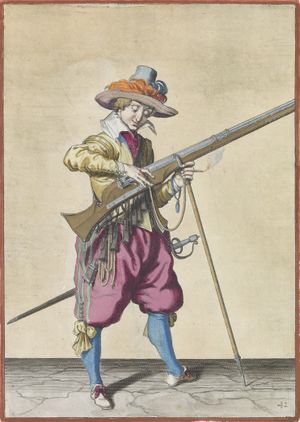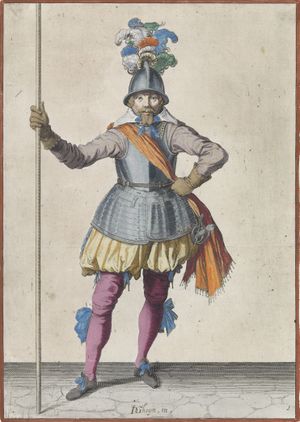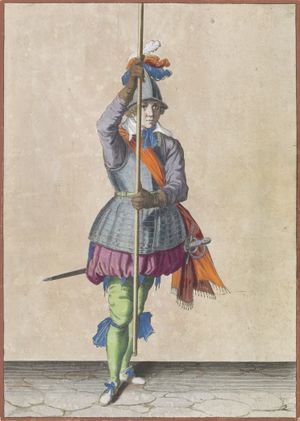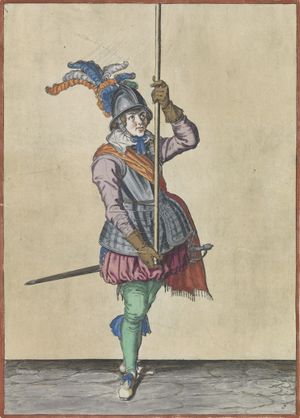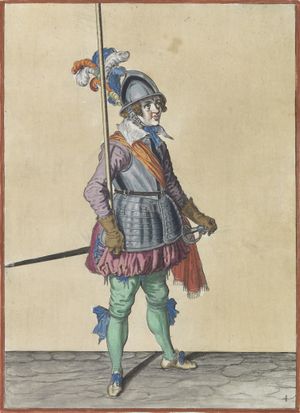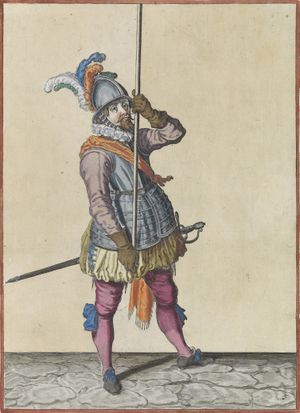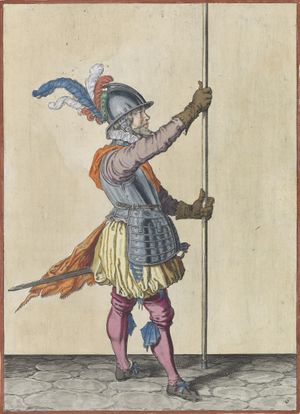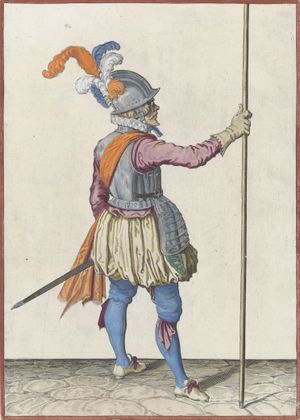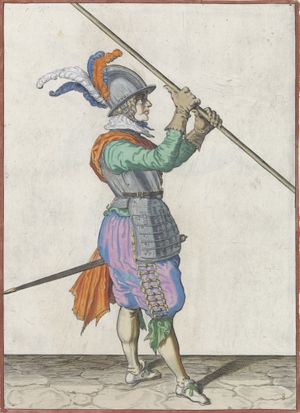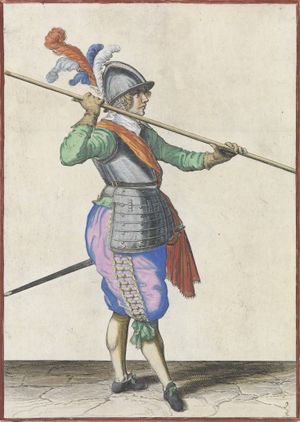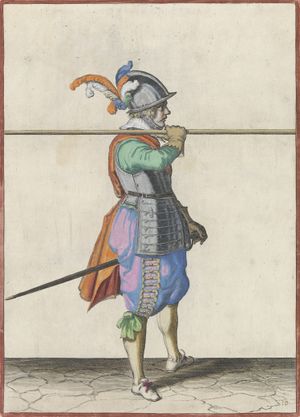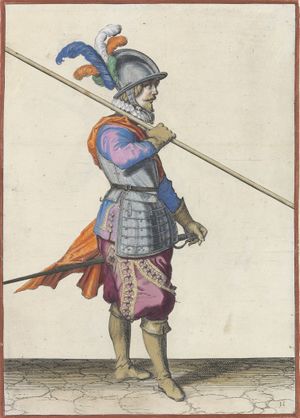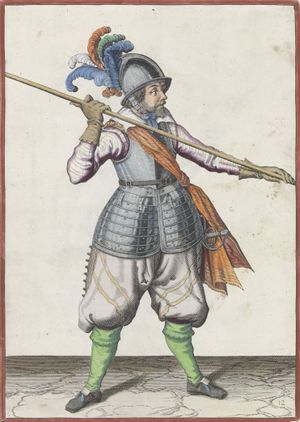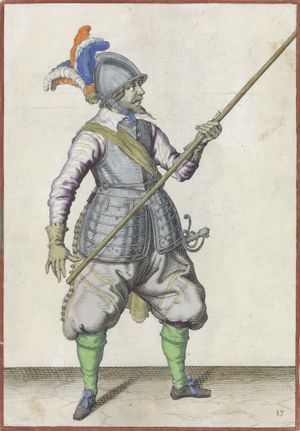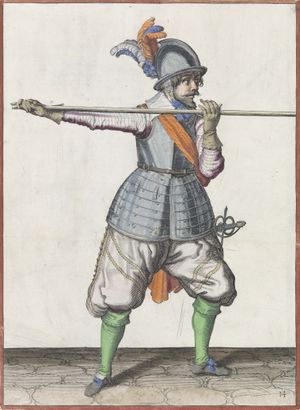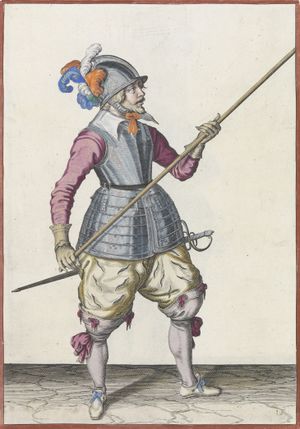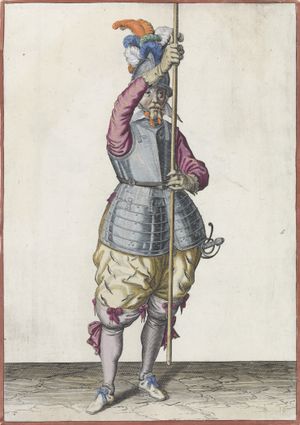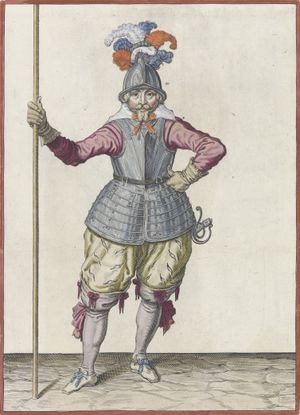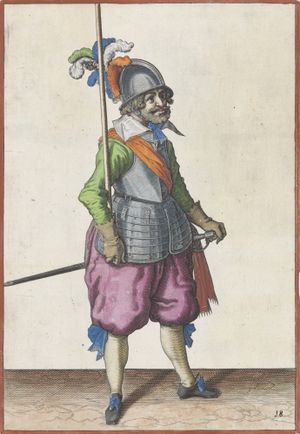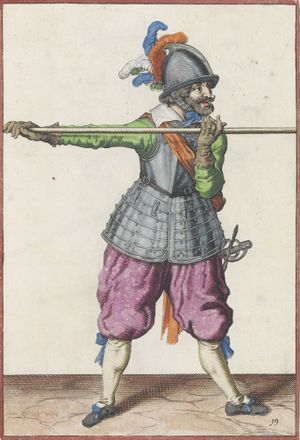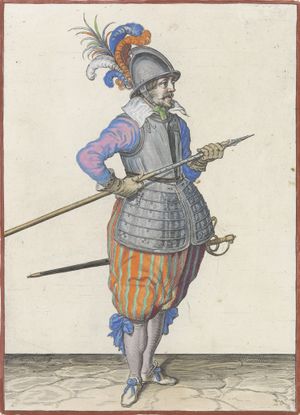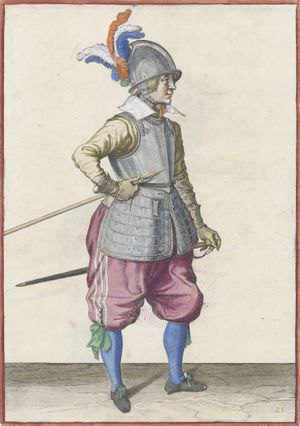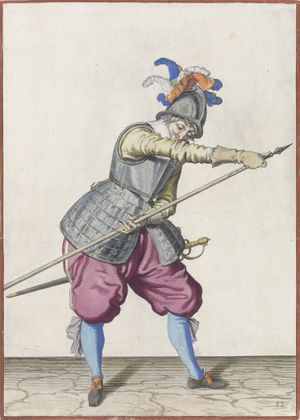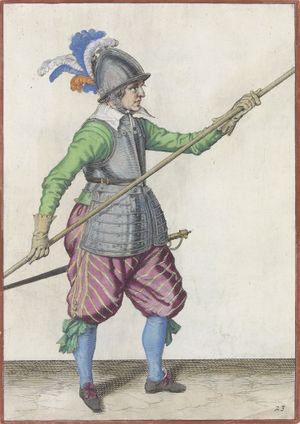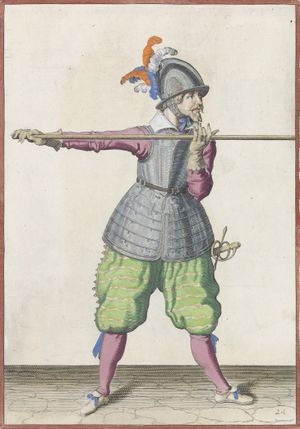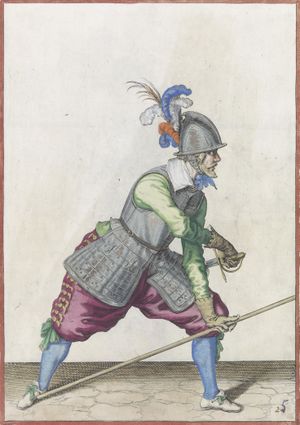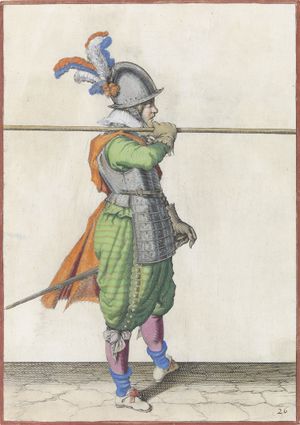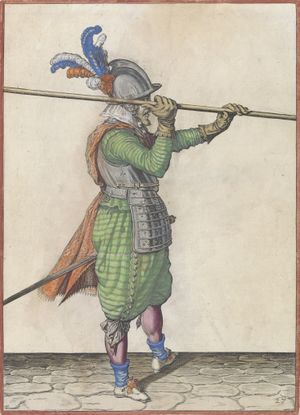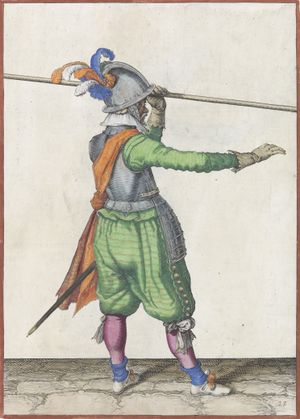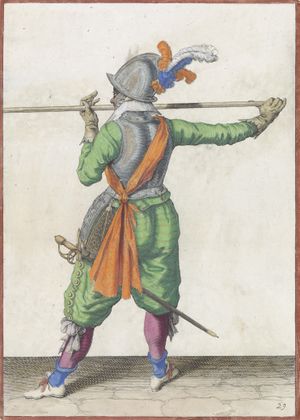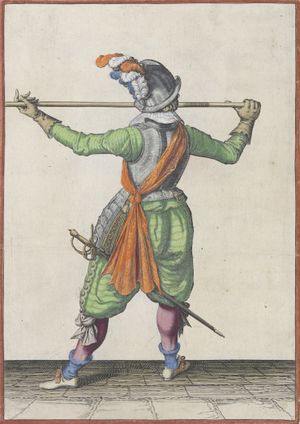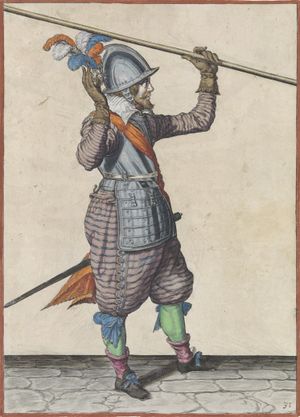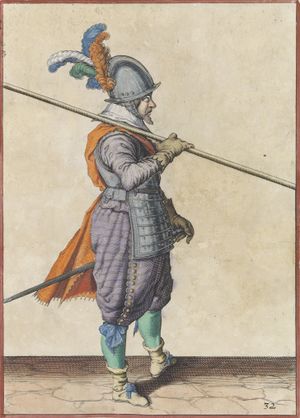|
|
You are not currently logged in. Are you accessing the unsecure (http) portal? Click here to switch to the secure portal. |
Jacob de Gheyn II
| Jacob de Gheyn II | |
|---|---|
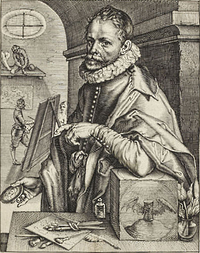 "Jacobus de Geyn, Antwerp Pict. et Sculpt." by Hendrick Hondius (1610) | |
| Born | 1565 Antwerp |
| Died | 29 March 1629 (aged 64) The Hague |
| Spouse(s) | Eva Stalpaert van der Wiele |
| Occupation |
|
| Nationality | Dutch |
| Influenced | Adam van Breen |
| Genres | Drill manual |
| Language | |
| Notable work(s) | Wapenhandelinghe van Roers Musquetten ende Spiessen (1607) |
| Concordance by | Michael Chidester |
Jacob de Gheyn II (Jacques; c. 1565 - 29 Mar 1629) was a Dutch painter and engraver, whose work shows the transition from Northern Mannerism to Dutch realism over the course of his career. De Gheyn painted some of the earliest female nudes, vanitas, and floral still lifes in Dutch art. He is credited with creating over 1,500 drawings, including landscapes and natural history illustrations.
De Gheyn was born in Antwerp and received his first training from his father, Jacob de Gheyn I, a glass painter, engraver, and draftsman.[1] In 1585, he moved to Haarlem, where he studied under Hendrik Goltzius for the next five years. He moved again, to Leiden, in the middle of the 1590s. De Gheyn married Eva Stalpaert van der Wiele of Mechelen in 1595. His son, Jacob de Gheyn III, was born in 1596, and grew to become an engraver in his own right, as well as the subject of a portrait by Rembrandt.[2]
De Gheyn's work attracted the attention of wealthy sponsors, and his first commission was for an engraving of the Siege of Geertruidenberg from Maurice of Nassau, Prince of Orange. This event, from 27 March to 24 June 1593, had been more of a demonstration of power by Prince Maurits, than an actual war, and had even attracted tourists. As a publicity stunt, the siege and its subsequent engraving were successful in propagating an image of Prince Maurits as an able general. Around 1600, de Gheyn abandoned engraving, and focused on painting and etching. Moving to The Hague in 1605, he was employed often by Dutch royalty, designing a garden in the Buitenhof for Prince Maurice which featured the two first grottoes in the Netherlands. After Maurice's death in 1625, de Gheyn worked for his brother, Frederick Henry.
Contents
HEMA Contributions
In 1607, de Gheyn created a series of prints illustrating militia drill with the caliver, musket, and pike. They were published in 1607-8 in the Hague, Netherlands, under the title Wapenhandelinghe van Roers Musquetten ende Spiessen ("Weapon-handling of Calivers, Muskets, and Pikes"); also included were anonymous descriptions and commentary in Danish, Dutch, English, French, and German editions.
In this concordance, the text of the commands and descriptions are placed alongside the illustrations; this layout was used in editions as early as 1609, but the first edition places them in three separate sections. The text can be read in the 1607-8 sequence on the transcription pages. Because a modernized English translation has not yet been produced from one of the original languages, the text of 1607 English publication has been placed in the first transcription column.
Images |
English Version (1607) |
Danish Version (1607) |
Dutch Version (1607) |
French Version (1607) |
German Version (1608) | |
|---|---|---|---|---|---|---|
[Ttl] The Exercise of Armes For Calivres, Muskettes, and Pikes |
Waabenhandling, om Rør, Musketter oc Spedser. , |
[Ttl] Wapenhandelinghe van Roers Musquetten ende Spiessen. |
[Ttl] Maniement d’Armes d’Arquebuses, Mousquetz, et Piques. |
[Ttl] Waffenhandlung von den Rören, Musquetten, undt spiessen. | ||
After the ordre of his Excellence. Maurits Prince of Orange Counte of Nassau etc. Governour and Captaine generall over Geldreland. Holland, Zeeland, Utrecht. Overyssel. etc. |
firgurlig affbildit. Med skrifftlig Undervisning. Med Kbbr. og dansk, tydsk, hollandsk, fransk og engelsk Text. : effter den høyborne førstes og herres herr Moritz, Printz aff Oranien ... ordning beskreffuedt |
Achtervolghende de Ordre van Sÿn Excellentie Maurits Prince van Orangie Grave van Nassau. &c. Gouverneur ende Capiteÿn Generael over Gelderlandt, Hollandt, Zeelandt, Utrecht, Overÿssel &c. |
En conformite de lordre de Monseigneur le Prince Maurice, Prince d’Orange, Comte de Nassau &c. Gouverneur et Capitain General de Geldres, Hollande, Zeelande, Utrecht, Overÿssel &c. |
Gestalt nach der ordnung des hochgebornen Fursten und herrn, herrn Moritzen Printzen zu Oranien, Graffen zu Nassaw &c. Gubernatorn und Capitein General uber Geldelandt, Hollandt, Zeelandt, Utrecht, Oberyssel &c. | ||
Set forthe in figures by Jacob de Gheyn. |
Figuirlyck vutebeelt, door Jacob de Gheÿn. |
Representé par figures, par Jaques de Gheÿn. |
Figurlichen abgebildet durch Jacob de Geÿn. | |||
With written Instructions for the service of all Captaines and Comaundours. For to showe hereout the better unto their jong or untrayned Souldiers the playne and perfett maner to handle these Armes. |
Met schriftelÿcke onderrechtinghe Ten dienste van alle liefhebbers der Wapenen, oock mede voor alle Capiteÿnen ende bevelhebbers, om hier wt hun Jonge oft onervaren soldaten de volcomen handelinge van dese wapenen te beter aentewÿsen. |
Ensemble les enseignemens par escrit. A l’utilite de tous Capitaianes et comandeurs, pour par cecÿ, pouvoir plus facillement enseigner a leurs soldatz in experimentez, l’entier et parfait maniement dicelles armes. |
Mitt beÿgefugten Schrifftlichen Undterrichtungen zum dienst aller und ieden Hauptloüthe, und befehlickhabere. damit sie aud dieser anzeigung Thro Junge und unerfahrne Soldaten zur volkommenen handtlung derselben waffen desto besser abrichten konden. | |||
Printed at the Hage. With Priviledge of the Emperours Ma.tie the King of Fraunce, and the Noble and mightye Estates General of the united Provinces |
Gedruckt in S Graven Hage. met Privilegie vande K. M: den Koninck van Vrancrÿck. en de E: M: Heere de Staten Generael der vereenich de nederlanden. |
Imprimé a la Haÿe en hollande, avec Privilege du Roy de France, Et de Nobles et Puisanse Seigneurs Messeigneurs les Estatz generaulx des Provinces unies. |
Gedruckt ins Graven hagen in Hollandt. met privileg: der Kay: Maÿt: des Könings in Franckreich und der Ed: M: Herrn Staten general der vereinigten Niederlanden. | |||
Excellentissimis, Potentissimisque Federati Belgii Ordinibus, summis reipublicae moderatoribus, eorundemque prudentissimo Status Consilio, nobilissimis, amplissimisq[ue] viris, belli artes ipsorum Sub imperiis feliciter exercitas hoc dono repraesentabat Iacobus Geinius. |
Illustrissimo Principi, maximo duci, Mauritio Nassauio Pr Araus. copiarum Federati Belgii imperatori, disciplinae militaris parenti, has excultae ab ipso armaturae affigies salutaris curae monumentum, dicabat Iacobus Geinius. |
|||||
[19] With Priviledge of the Emperours Matye.The French Kinges, and the Lords Estates of the United Provinces &c. |
Met previlegie vande key: ma: den koninc van urancrÿck, en de e. m. heeren Staten Generael der Vereenichde Nederlanden. |
[1] Avec previlege de l'Empereur, du Roy de France, et de nobles et puissans seigneurs, Messeigneurs les Estatz Generaulx de les Provinces Uniés. |
||||
Where of the contence is such. No man of what qualitie or condition soever he be, shall undertake to contrefaict this present bocke of the exercise of Armes, or any where els contrefaited-sell the same, with in theyr Empire Kingdome or Landes, in the tyme of eight yeares followinge, be it in small or great, in parte or whole, neither the writinges nor the figures, nor the order kept in this worke, any wayes to followe without expresse consent or leave of Jacob de Gheyn upon payne of losse of all the contrefaict worke, and three score pound sterling besides, as more plainely is to sene in the principall letters give here of unto him, &c. |
Ende is den inhout aldus luydende. Dat niemant hem en vervoordere t’sy van wat qualiteyt ofte conditie hy sy, dit teghen woordich boeck vande Wapenhandelinghe naer te maecken, oft elders naer ghemaeckt binnen haere Rÿcken ende landen te vercoopen, binnen den tÿt van acht naervolghende Iaren, t’sy int cleyn ofte int groot, int deel ofte int gheheel, de schriften noch oock de figueren, oock de ordre in dit werck ghehouden gheensins naer te volghen, sonder expres consent van Jacob de Geyn op verbeurte van allen het naer ghemaeckte werck, ende ses hondert Carolus gulden daer en boven, als breeder blÿckt by de principale brieven hem hier van ghegheven, &c. Anno 1607. |
Et est le contenu dudit Previlege tel que s’enßuyt. Que nul de quelle qualite, ou condition quil soit, ne s’avance de contrefaire ce present livre du maniemēt des armes, ny d’en vēdre des contrefais ailleurs, en leurs Royaumes terres & seigneuries, dans leterme de huyt Ans prochainement venans, soit en grande, ou petitte forme, entier, ou par portions, ny de suyure l’ordre soit de l’escriture ou des figures representées en ce Livre, sans le consentement expres de Jaques de Gheyn, sur peine de confiscation, de tout ce que sera trouvé ainsi contrefait, & de six Cens florins d’amende pardessus, comme il est plus aplain contenu aux lettres origineles données &c. Anno 1607. |
||||
A remembrance for the Bookebindere. The writinges are (as also the figures) dealt as in three sundry partes, as Calivres, Muskets and Pikes, and shall be bound-in after this fashion: The wrytinges of the Calivres before the figures of the same, and the other writinges likewise, eche before theyr owne figures. |
Tot memorie vanden boeck-binder. De schriften zÿn (ghelÿck oock de figueren) in dry besondere deelen afghedeelt, als Roers, Musquetten ende Spiessen, ende sullen inghebonden worden op dese manier, te weten, de schriften vande Roers voor de figuren der selve, ende de ander schriften van ghelÿcken elckx voor hun eyghen figueren, &c. |
Memoire pour le libraire. L’enseignement par escrit est, comme aussi les figures, reparty en trois, comme les Harquebuses, Mousquetz, & Piques, & doibuent estre reliéz en ceste sorte à savoir l’enseignement pour les Harquebuses devant les figures d’icelles, & les aultres à l’advenant chacun devant les propres figures. |
||||
[1] Dem durchlauchtigen hochgebornen fursten und herrn, herrn Joachim Ernsten Marggraven zu Brandenburg, in Preussen, zu Stettin, Pommeren, der Casszuben und Wenden auch in Schlesien zu Grossen und Jägerndorff, &c. Hertzogen Burggraven zu Nurnberch und Fursten zu Rugen, meinem gnedigen Fursten und Herrn. | ||||||
[3] To the Prince. Nor your highnes, nor any man to whose vew this present booke shall come, shall need to finde it strange, either, why it hath borrowed an English habitt, or shrowded it selfe under so great a protection: since on the one side it represents unto You that manner of exercise of Armes, which hath for many yeares bene practised in this schoole of warre, the United Provinces, and that, by a Captayne whose worth (I thinke) not any part of the world is ignorant of: in which warre the valure of the English and Schottish nations (now Brittaynes) hath bene of that speciall marke and note, that, for readye use of theyr Armes, provident care of the Commaunders and commendable obedience of the Souldier towards his chiefe, it can not be denyed but that the Provinces have received verye acceptable services at theyr handes. On the other side: to whom could I (in judgement) more fitly and (as I may saye) justly, addresse the proprietye of a worke of this worthe and nature? then to a Prince descended from so many powerfull and victorious Kinges, who even by destyny and judgement of all the world, is not onely the heyre of theyr Fortunes, but an inheritour of theyr vertues also: then to a Prince the sonne of the most puissant Kinge of all his predecessours: who, though he blesseth his Realmes with the sweetenesse of peace, yet (doubtelesse) he placeth the securitie of that content, in the due and lawfull exercise of Armes. Lately, to whom rather (I saye) should I dedicate this worke? then to a Prince, that through the light of his owne proper example, doth so much beautifye and ennoble the practise of Armes, who even in the fore-springe of his yeares and amidst so many other princely entertaynements fitt for his youth and state, doth yet give such a lustre to this of Armes, by the coutinuall familiaritye he hath with them in his often practise, that I thinke I may saye, and saye truely, that the most true and perfect knowledge of them is rather to be found with your Highnes, then brought to You. Therefore, as all those excellent professours of excellent sciences (wherein yet your Highnes excells them all) are every one in speciall duety bound, to give the best testymonye they can of theyr thankefulnesse, both in regard of the favour which some receive in being nere You, and also of the honour which You doe to all theyr professions, in not disdayninge to participate with theyr industries: So have I in all humble and due respect, thought it fitt, to tender You this acknowledgement of myne, hopinge that your Highnes shall receive no small contentement, by addinge the longe experience of the Nether-lands practise to Your owne knowledge of ancient Histories, and those wise and deep-grounded instructions of that great Monarche the Kinge Your Father. Your Highnes his. Most humble servant in all duetye at command. Jacob de Gheyn. |
Durchlauchtiger, Hochgeborner Furst, Gnediger Herr. Wie Ersprieszlich und nottig es in diesen leufftē einem Fursten, und herrn ist, sich zum krieg gefast und fertich zu haltē und zu dem endte so woll sich selbsten alsz die seinigē in den Waffen zu uben, das auch solches wol zu erlehrnē und zu erfharen kein bequämere gelegenheit gefundē werdē könte, dann in dē Niderlandischē krieg, so durch dessen langwurigkheit zu einer seltzamen Vollkommenheit gebracht innsonderheit unter dem furtreffelichem gelëydt des allerberuemstē Veldt-Obristen desz durleuchtigen hochgebornen Fursten und Herrn, Herrn Mauritzen Printzen von Oranien Graffen zu Nassaw, &c. Hier von wurdt vielleicht sonsten jemanten noch eigentlicherē bericht aber mit nichten E.F.G. diese anzeigung zu thun vonnothē sein, Sintemahl die selben selbst in eigner persohn der weit khundig gemacht, und gnugsam sich erzeigt, in deme dieselb nun von ettlichen Jahren hero in geselschafft desz hochgedachten Printzen, dem kriegswesen bey gewohnt, und daselbstē mancherley gutt und bewehrte probstuckhe einer furtrefflichcn hochbegabten anleyttung neben dero Furstlichen groszmuettigkheyt und des Churfurstlichen Brandenburgischen hauses sonderlichen angeborner kriegstugēd undterzeygt dannen her ich dann ursach genōmē E.F.G. weill mier woll bewust, das auch bei deren mannichfaltigen grosswichtigen sachen und handlunge dieselben in allerlei loblichen kunsten und insonderheyt der kunstreichē Mahlerey und des bildthawēs eine sonderliche grosse lust schepffen dissgegenwertig werckh und solche meine arbeitt so die figuerliche abbildung vorgemelte Waffenhandlung innsich helt, nach der vorschrifft model und anordtnung des Hochgebornen Printz Mauritzen, &c. sampt einer notturfftigen erklärung desselben allen in Hochteutscher sprach, in untenhenigkheit anzubicten, und furzubringen, damit ich mit einer so geringen erzeigung meines unterthenigen diensts dero selben grosse erzeigte gnadt und wolthaten so von E F.G nur als deroselben gehorsamen diener, einem erwiesen, ettlicher massen verschulden möchte. Bitt E. F. G. zum demutigsten, die geruhen diese meine unterthenige erzeigung meiner dienstbaerkheit fur angenheme zuhalten, und in allen beharrlichen gnaden uon mier anzunchmen. Thue hiemit E. F. G. in langwiriger frischer leibsgesundheit zu allem hohen Furstlichen wolstant und glucklichen Regierung der Gottlichen beschirmung treulich und dero F. gnaden mich unterthenig besehlen, &c. E. F. G. Undertheniger Diener Jackob de Geyn. | |||||
|
[5] To Those That Love the Exercise of Arms Wissheth Jacob de Gheyn Heath and prosperitie. It is out of all doubt, that neither the quietneße of a common wealthe without armes, nor the armes without convenient or due exercise, can stand or be maintained. Which hath not onely bene well considered by the old sages or wise, that have undertaken to give any examples of lawe, but is approoved by the effectuall experience of the most famous Townes and People, that have preserved their Estate chieflye by those meanes. And examining the further course of the whole World, we shall find, that the soveraigne powre hath alwayes bene by those which here in did most surpasse theyr neighbours. The Grecians, in the time thye have bene in theyr most shyning glorie have much embraced this point, and therein by theyr witt not little proffited. Yet the Romains have farre surpaßed here in as well those as all others, and ever exercised theyr youth at all kinde of armes by those whom they called Campi-doctores or Mastres of the field. Which maner is playnelye showed unto us, in the writinges that are thereof come to our handes, the same reason standeth fast for ever, and with all nations. But in regard that not onely the use but even the armes them selves are much changed chiefly sithence the findinge out of Gun pouder, it can not be denied but that wee can reape small or no benefite by the old rehearsals, without wee have neewe instructions. His Princely Exce. therefore the Earle Maurice of Naßau &c. to whose care (by the Lords Estates generall of the united Provinces) is left the charge of defending so worthie countries and the conducting of a warre which is taken for a schoole or patterne to the whole World, Like as he throughout the whole militarie order (before his times much decayed) hath restored and partelye brought to the examples of the old, partely by his owne inventions amended and adorned, so hath he taken great regard to the exercise of Armes, as one of the principall partes of the militarie ordre, where out are risen such comodites as unto every man is knowne not onely in these Countries but also in the uttermost partes of the worlde. |
[3] Den beminder vande wapenhandeling wenscht Jacob de Gheyn ghelijck ende voorspoet. Buyten twÿffelist, dat noch de gherustheyt vande ghemeene saecken sonder wapenen, noch de wapenen sonder bequame oeffeninghe en connen bestaen. T’welck niet alleen welbemerckt is by de oude wÿsen, die haer onderstaen hebben eenigh voorschrift van wettn te gheven, maer oock bevestigt met de datelÿcke ervaringe van de wÿdtberuchtste Steden ende Volcken, die haeren stant door dese middel insonderheydt hebben bewaert. Jae insiende hes vervolghen der gheschiedenissen vande gantsche Werelt, men sal bevinden, dat de heer schappÿe altÿt gheweest is by de ghenen die hierinne haeren naeburen meest hebben overtroffen, De Griecken, ten tÿde dat sy in haere hoochste glants zÿn gheweest, hebben dit stuck seer behertight ende door haer vernuft niet weynich bevordert. Doch de Romeynen hebben soo weldesen als allen anderen hierinne seer verre te boven ghegaen, ende hare jonckheyt seer ghestadigh doen oeffenen in het ghebruyck van allerley wapenen, door de gene die sy Campidoctores oft Veldt-meesters noemden: welcke manier ons seer duydelÿck werdt aenghewesen door de schriften die ons daer van ter handen zÿn ghecomen. De selve redene duert altÿt ende by allen: dan alsoo de wapenen seer veranderen, by sonder sedert de vindinghe van het Buspoeder, soo en connen ons de oude vermaninghen niet dienstigh zÿn sonder nieuwe onder wÿsinge: zÿn Vorstelÿcke Ghenade Prius Maurits van Naßouw &c, wiens sorghe bevolen is (byde moghende Heeren de Generale Staten der Vereenichde Nederlanden) de bewaringhe van soo treffelÿcken landtschappen, ende het beleydt van een Oorlogh, t’welck is ghehouden gheweest als een Schole vande heele Werelt, gelÿck hy deurgaens de heele Crÿgs-ordre voor zÿne tÿden seer vervallen weder heeft opgerecht ende ten deele gebracht tot der ouden voorschriften, ten deele met zÿn eyghene vonden veel verbetert ende vercyert, soo heeft hy op de Wapenhandelinghe, als een voornaemste ghedeelte vande crÿgs-ordre, oock voor naemelÿck ghelet: waer uyt dan gevolcht zÿn alsulcke vruchten, als een yder niet alleen hier te landen maer ooch inde vyterste deelen van het aertrÿck ghenoech zÿn bekent. |
[3] Aux amateurs du maniement des armes, Jaques de Gheyn desire salut et prosperite. C’est chose hors de doubte, que le repos d’une Republicquè, ne peult subsister sans tes armes, ný les armes, sans exercice. Ce que non seulement à este tres bien remarqué par les sages anciens, qui se sont efforçez d’en donner des exemples d’institutions & loix; mais außi approuvé par experiencé effectuele des villes & peuples plus celebres, qui ont conservé leur Estat; speciallement par ces moyens, voires regardant les Histoires de tout le Monde universel, on trouvera que la domination, & auctorité, a tousiours este vers ceulx, qui (en cecy) ont le plus sur passè leurs voysins, les Grecx, du temps de leur plus grande splendeur, ont prins ceste partie fort à coeur, & par leur subtilité n’ont point petittement advançé Et les Romains y ont surpaßé & ceulx cy, & tous aultres de beaucoup, faisant fort constament & continuellement exercer leur jeunesse, en l usage de touttes sortes d’armes, par ceulx quilz nonmoient Campidoctores, ou maistres de Camp, ainsi que se voidt clairement, par les escritz, qui nous sont demeurez d’eulx, les mesmes raisons durent tousiours, & envers tous. Mais comme les armes se changent fort, notament dé puis l’invention de la pouldre a canon, ainsi les vieux recitz ne nous peuvent servir sans nouveaux enseignemens. l’Excellence du Prince Maurice de Naßau, &c. au soing duquel est commise (par les trespuisiants Seigneurs les Estats generaux des Provinces unies) la conservation de si puissant estat, la conduite d’une guerre, qui a esté tenue & reputée comme une escole de tout le monde, à relevé, enbelly, & melioré tout l’ordre de la guerre (fort a bastardy avant son temps) partie suyvant les Reigles des ançiens, partie de sa propre invention, prenant tressoigneux regardt, sur le maniement des armes, comme estant une tres importante partie de l’ordre de la guerre, dequoy se sont ensuyvis fruitz, congneuz, non seulement en ces Pays, mais aux plus eslongnées parties de la terre. |
[89] Den Liebhaberen der Waffenhandlung wunscht Jacob de Geyn gluck und heyl. Es ist ohne zweiffel ie und allwegen so beschaffen gewest, das weder die ruehe des gemeinen wollstants ohne waffen, noch die waffen, ohne bequäme übung bestehē khonnen. Welches dā nicht allein bey den alten weysin wol angemerkt, die sich auch dißfals understanden niet allein ihre vorshrifften der gesetze hier von zugeben sonderen auch mit wurcklicher erfahrung der weitt berhuemtsten Stette und volcker, die ihren wolstant durch solche mittel in sonderheit erhalten und bewahrt, bekräfftiget werden, ja wen man die geschichten der gantzen weit einsehen wolte, wirdt sichs befinden, das die herrschafft iederzeit bey denjenigen gewest sei, die ihren nachtbarn am maisten hier innen ubertroffen. Es haben auch die Griechen wie sie in ihrem höchsten glantz gewest, diese sach fehr behertz iget, und durch ihre vernunst nicht wenich befürdert. Aber die Römer habē so wol den Griechē als allē anderē in solcher ubung sehr weitt ubertroffen, und ihre lugendt stettigs im brauch der waffen, durch die jenigē so sie Campi doctores oder Veldtmaister nenneten, mit sonderem fleisz uben lassen, welche handlung uns sehr deutlich in deroselben schrifften die uns von ihnen zun handen sind khomen, angewiesen wirdt, eben die selbige mainung hats noch jederzeit bei menniglich, weil aber die waffen sehr verändert und weit anderst gestalt sint., insonder heyt seidt die erfindung des zundtpulvers auff khomen so khonnen uns die alten ermahnungen ohne die neuwe anleytung nicht dienstlich sein. Nun aber hatt der durchleuchtig und Hochgeborn Furst Mauritius Printz von Oranien, Graven zu Nassou, &c Gubernator und Capitein General uber Gellderland, Holland, Zeeland, Utrecht, Oberÿßell, &c. auß hochtragendem ampt und vorsorge uber diese furtreffliche lande, in dem gemeinem Kriegswesen, so heuttiges tages fur eine schuele der gantzen welt geacht wirdt, gleich wie ihre F.G. die gantze kriegs ordnung so vor diesem fast verfallen gewest, wiederumb auff bericht, und zum theill solche auff den alten model und vorshrift gebracht, zumtheill auch mit deroselben eignen erfindung gar sehr verbeßert und gezieret, und dem nach auff die waffenhandlung als dem furnembsten theill der selben Kriegsordnung auch furnemblich achtung genommen, daraus dan solche herrliche fruchte wie einem iederm nicht allein hie zu lande, sondern auch in den eußersten enden des Erdtbodems bekhendt, erfolgt sindt. | |||
This hath bene the chiefe cause that hath mooved me to give out the order which his Princely Exce. in the using of the Calivres, Muskets and Pikes doth observe as the perfectest and best patterne, as well to pleasure those whose duety it is to followe the order of his directions, as to accomodate any other who shall seeke to draw benefytt to hym self by so necessary exercise and practise of armes. Having to that purpose drawne all the postures that come in the holding or using of the armes by order and the same described with his reasons and wordes of com̄and: A worke (without question) very fitt for novices and yonge souldiers to whom it belongeth to exercise them selves with great diligence herein, verye necessarye also to all Captaynes and Comandors the better to looke to the exercising of souldiers, and lastly verie proffitable to all Princes and People, be it in tyme of warre the better to defend them selves, and offend theyr ennemyes or be it in time of peace with the more facilitye (by this kinde of exercising) to draw a better aßurance to them selves, and become the more dreadfull and redoubted to others. Seeuing then our meaning goeth no further then to instruct the untrained souldiers and to reinforce the minde of the expert by the sight and reading of it: No man shall finde it strange that wee in drawing of the Pikes, onely set that which for the use of the same is most necessarye, omitting diverse māners of toßing of the pike by forme of recreation, which in militarie exercise bringeth little benefite or profite. |
Dit is de oorsaecke gheweest die my heest beweecht om de ordre die de selve zÿn vorstelÿcke Genade in de handelinghe van Roers, Musquetten ende Spiessen doet onderhouden, als het bequaemste voorbeeld, in t’licht te geven, soo om dien te gerÿven, welcker plicht het is de ordre van zÿne vorstelÿcke Genade te achtervolghen, als om alle anderen het gunt van soo noodighe oeffeninghe mede te deelen: hebbende tot dien eynde alle de ghestaltenißen, die in het handelen van elck wapen te pas comen, by ghedeelten vervolghens afghebeelt, ende t’selve met de redenen van dien ende de ghewoonlÿcke bevel woorden ver claert: een werck (soo ick meyne ende oock niet en twÿffel) seer dienstich voor jonge eñ eerst aencomende crÿg stuyden, dien het toestaet haer hierinne naer stelÿck te oeffenen, seer noodig voor alle Hopluyden ende crÿgs bevelhebbers, om te beter op de oeffeninghe van haere crÿgsluyden te connen letten, seer oorboir voor alle Vorsten ende volcke, t’sy in tÿden van Oorlog, om haer selve te beschermen ende haere vyanden te crencken, t’sy in tÿden van vrede, om door alsulcke oeffening selfs te onbevreesder ende by anderen te ontsicchelÿcker te werden. Alsoo dan onse meeninghe niet verder en streckt als om de onervaerenen crÿg sluyden te onderwÿsen, ende der ervarenen geheuchenisse door t’ghesicht ende lesente verstiercken, soo ensalniemant vremd vinden, dat wy in de afbeeldinghe vande Spiessen niet anders en hebben ghestelt, als t’gunt tot het ghebruyck der selver in t’Oorlogh noodighste scheen te zÿn, overslaende veel manieren om de selve speelghewÿs te handelen, die in de Crÿgs-oeffening gheen sonderlinghe woordeel en doen, |
C’est l’occasion qui m’a meu, de mettre en lumiere par figures (comme la plus sortable representation) l’ordre que son Ex. fait observer au maniement de l’Harquebuse, Mousquet, & Picque, tant pour en accommoder ceulx qui sont profeßion, de suyvre ledit ordre, comme pour faire participans tous aultres, en instruction tant necessaire, ayant a ceste fin, representé esdites figures le patron de tout ce que vient a point au maniement, & usage de chacune sorte d’armes, par parties s’entresuyvantes, avec les raisons requises, & esclairçy les motz ordinaires de commandement. Oeuvre (comme ie pense, & n’en doubte point) fort propre pour jeunes, & nouveaux Soldatz ausquels est convenable de s’exercer sonigneusement, tresneceßaire à tous Capitaines, & commandeurs, pour tant mieux, & plus curieusement prendre garde à l’exercice de leurs Soldats, trescommode à tous Princes peuples, soit en temps de guerre, pour se conserver, & endommager leurs ennemys, ou en temps de paix, pour par tel exercice estre plus à repos, & plus redoubtez & formidables aux aultres. Comme donc nostre intention ne passe point plus avant, que pour enseigner les Soldats inexperimentez, & renforçer, par inspection & leçon la memoire de ceulx qui sont desia expers, ainsi personne ne trouvera estrange, qu’en la representation des Piques, nous n’y avons mis aultre chose, que ce, que (pour l’usage dicelles) semble estre le plus necessaire à la guerre, paßant pardessus beaucoup de façons, qui si practiquent, par maniere de paßetemps, & ne servent de guerres, en l’exercice militaire. |
Diese ursach hatt mich bewegt, die ordnung so hochgedachte ihre F.G. in der handlung des Rohrs auch, Musquetten und Spiesses halten und observirē laßen, wie ein allerbequämlichster vorbildt ins lichtzu bringen so woll zur notturfft der ienigen die ihrer F.G. in solcher anordnung zugehorsamen verpflicht sind, als auch allen anderen die nutz bartheyt einer so nott wendigen ubung mit zu theilen, zu dem end so hab ich alle die gestaltnussen so in der handlung einer ieden waffen zu statten khommen in der abtheylung nach ein ander abgebildet, und dasselbige mit deutlicher mainung und gewohnlichen befehlichs wortten erklärt. Welckes werck (meiner geringen einfalt nach, und wie ich dan auch gar nit zweiffel) fur die jungen und erst ankhommende Kriegsleuthe sehr dienstlich sein wirdt, den es ihnen gebüehren will sich hier innen fleißig zu uben darzu ist es auch fur alle und iede haubtleuthe und kriegsbefelhabere sehr not wendig, damit sie desto beßer auff die ubung ihrer kriegsleuthe achtung nemen khunnen, zu dehme so sol es auch fur alle andere Fursten und Herrn und deroselben landt und leuthe es sei in kriegslaufften sich dar durch zu beschirmen, und ihren seinden abbruch zu thun oder auch in friedens zeitten, da mit sie durch solche ubung nit allein ihren und den ihrigen desto weniger schew fur den waffen sudern auch ihnen selbsten desto mehr forcht und ansehens hey anderen verwecken und zu wegen bringen khondten, ersprieslich befunden werden. Wie dan unser intention und meinung sich weitter nicht estrreckhen thuet, dan nur die unerfahrne kriegsleuthe lehrnen, und der erfahrnen gedächtnusz durchs anschawen und lesen zu versterckhen so wirdt dan niemandt frembdt zu sein befinden, das wir in der abbildung der Spiesse, anders nichts gestelt haben, als das ienige so zum gebrauch der selben am nottwendigsten im krieg erscheinen mochte, und viel andere manier, wie man die selbe schertz und spiell weisz handlen solle, weill khein vortheill dar durch in der kriegsubung geschehen khan, ausgelassen und uberhupfft. | |||
|
Concerning the different or sutable apparell and armes of the figures, there is to be considered, that the shott with head peeces, and the Muskettiers with hattes are drawne and differently appareled, not that we holde it for neceßarie, but that such varietye might give the fuller ornament to the figures, and to showe to posteritie the manner of souldiers apparel used in these dayes, Like as on the other side the Pikemen are all armed after one sorte or kinde, for no other reason then to represent the right māner and fashon of the arminge of his Excc. owne Garde, as it is at this tyme. ln the small shot and Musquettiers, you shall also consider that the first figure showeth how a man shall holde a Musket or Caliver already charged upon his shoulder, and the other pictures followinge tell what is further to be done bothe for discharging, and lykewyse for charging againe of the peece. And because that every man standing still shall knowe how to behave him self in tyme of need, there is pro- [6] perly set downe in the ende ech severall picture with his severall difference of stand or posture and that to give truer light to the judgement of the observer. But above all is to be well considered that which seemes here to require a leasurly and slow proceeding in the apprehension (by reason of the smalenes of the sculpture which could not conveniently be otherwise formed) that I say) must the industrious learner with a diligent practise strive to bringe to a nimble and quicke readines of action. Nevertheleße so, as that in the best fashon and with the most care and providence he make it appear that it is to offend the ennemy without hurting or anoynig him self or his fellowe, the rest the written instructions and the pictures shall shewe. |
soo veel aengaet de verscheydenheyt ofte eenparicheyt vande cleedinghe ende wapenen van dese beelden staet te weten dat de Schutten met stormhoeden ende de Musquetdragers met hoeden zÿn ghestelt, ende verscheydelÿck ghecleedt, niet om dat sulcx noodigh is, maer om door alsulcke veranderinghe de beelden te vercieren: ende de maniere vonder Crÿgsluyden cleedinghe in desen tÿt ghebruyckelÿck oock aende naercomelinghen te verthoonen: ghelÿck tot ander zÿde de Spiesdraghers eener wÿse zÿn ghewapent om gheen ander redenen als om daermede aen te wÿsen de [2] maniere van wapenen die de lÿswacht van zÿn Vorstelÿcke Ghena de jegenwoordich is draghende, inde Schutten ende Musquetdragers sult ghy mede bemercken, dat de cerste figure uytwÿst hoemen het Roer ofte Musquet alreede geladen op schouder moet houden, ende de naevolgende wat voorts ghedaen moet werden tot het aflossen, ende also voorts tot het wederladen toe, ende om mede te thoonen hoe dat een yeder stilstaende in tÿt van noot hem behoort te dragen soo wert in de laetste beelden van elcke soorte de maniere van schiltwacht te houden aengewesen, voor at dient ghelet dat t’gunt alhier langhsaem ende met drachten schÿnt toe te gaen, overmids dat de afbeeldinge niet dan by cleene ghedeelte heeft connen gheschieden, t’selfde den jongen Crÿghsman hem door lange oeffeninge moer ghewennen heel veerdigh te doen, ende nochtans op de schickelickste maniere, ende met de meeste voorsichticheyt om den vyant afbreuck te doen sonder hem selven oft zÿne mede ghesel te beschadighen. T'voorder sal de schrÿftelÿcke verclaringhe wet de beelden t’samen uytwÿsen. |
En ce que touche la difference, ou ressemblance des habits, & armes de ces figures, il fault sçavoir, que les Harquebusiers y sont representez avec morions, & les Mousquettaires avec des chapeaux, & vestuz diversement, non point que cela soit necessaire, mais pour enbellir les portraitz, par ceste variete, pour faire voir la façon des habilemens des gens de guerre de ce temps, à ceulx qui viendront apres nous, comme d’aultre part, que les Piquiers sont armez tous d’une sorte d’armes, n’est pour aultre raison, que pour monstrer la façon des armes, que son Ex. fait porter aux gardes de son corps. Vous remarquerez außi aux Harquebusiers & Mousquettaires, que la premiere figure demonstre, comme on tiendra sur l’espaule l’Harquebuse ou Mousquet desia chargé, & les suyvantes, ce que dèpuis doibt estre fait, jusques à avoir tiré & consequament jusques a avoir rechargé, außi pour monstrer, comme chacun (au besoin) estant ferme, debout, se doibt contenir, & en la derniere figure, de chaque sorte, la maniere de tenir sentinelle, remarquant devant toutte chose, que ce que cecy semble aller avec longueur, pour ceque la representation n’ayant peu se saire, que par petites parcelles, le jeune Soldat, doibt, par long exercice, s’accou, stumer, a faire le tout promptement, neantmoins avec bienseance, & prevoyance, pour endommager l’ennemy se conserver, ensemble ses compaignons. Le surplus s’enseignera par la demonstration escrite & la figure. |
So viel nun der uudterschiedt oder auch die gleichformigheit der kleidung und der waffen in diesen figuren betrifft, soll man wißen, das die Schützen mit Sturmhueten, und die Musquetiers mit huetten furgebildet, und in underschiedlichen kleydungen staffirt sind, nicht das solchs nöttig were, sonderlichen nur damit durch solche veränderung die bildungen geziehret und dan auch die manier der kriég sleuthe in ihren kleidungen so ietz in diesen zeittten gebreuchlich, und im schwang sind, den nachkhumlingen gezeigt wurden. Gleich wie hergegen die [90] Spiesser auff einer ley gestalt und weise gewapnet sind ausz kheiner anderen ursachen, dan nur allein damit die ietzige weisz und gestalt der waffen, wie heutigs tags ihrer F.G. leibswacht gewapnet anzuschawen, Bey den Schutzen und Musquettieren wirdt man auch anmercken khönnen, das die erste abbildung aussweist, wie man das Rhor oder Musquett so schon albereidt geladen auff der schulteren haltten, und in den nach folgenden, was man weitter thun musz bifz zum loßdrucken, und so immer forth bisz zum widerladen, damit man auch anschawen moge, wie ein yeder stillstehendt in zeitt der noth sich verhalten soll, so wirt inden letzen bildungen einer ieglichen gattung ihre schiltwacht zu halten angewiesen. Fur allen dingen wirdts von nöten sein achtung zu geben, das man das ienige so alhie lang weilich und gleichsamb als mit absunderlichen gerichten auff getragen scheint, dieweill die abbildung anders nit dan durch kleine abtheylungen hatt beschehen khönnen, dasselbige den jungen unerfahrnen kriegsknechten durch langwurige vbung gantz hurtig zu verrichten, und gleich woll auff die aller-zierltchste weise und mitt der maisten fursichtigkheyt seinem feindt abbruch zu thun aber doch ihme selbsten oder seinen spiessgesellen kheinen schaden zu zu fuegen gewehnen musz, das ubrige wirdt die schrifftliche erklerung mit den figuren gnugsamb anweisen. |
Images |
English Version (1607) |
Danish Version (1607) |
Dutch Version (1607) |
French Version (1607) |
German Version (1608) | |
|---|---|---|---|---|---|---|
[7] Shorte Instruction Upon the Contrefaictinges, Touching the Right Use of Calivers, for the yonge or inexpert Shot, which instruction by Cypher letters is agreeing or answering orderly with every picture. And because here to are joyned some pictures of standing still for sentenels, to shew how the souldier in tyme of need (readie with his peece) shall stand, there fore doe the writinges also there of agree with every figure or picture, according his number. |
[5] Corte onder wysinghe op de figuerliicke afbeeldinghe, belanghende t'recht ghebruyck des Roers, voor de jonghe ofte onervarene Schutten, welcke onderrechtingh by syfer ghetal op elcke figure vervolghens is corresponderende. Ende alsoo noch eenighe stilstaende figuren tot Schiltwachten hier zÿn by ghevoecht, om te wÿsen hoe den Soldaet in tÿt van noot (met zÿn Roer al ghereet zÿnde) staen sal, soo accorderen oock de schriften hier van, op elcke figure achtervolgens hun getal. |
[5] Brief Enseinement, sur la representation des figures, du droit maniement de l’Harquebuse, pour les Jeunes & inexperimentez Harquebusiers, qui correspondt par nombres d’Arithmeticque, de l’enseignemēt aux figures, & comme il y à jointement quelques figures, pour monstrer, comme le Soldat le tiendra en sentinelle, en temps necessaire, avec l'Harquebuse toutte preste, chacune figure s’accorde, a la demonstration escrite, suyvant son nombre, |
[1] Kurtzer bericht auff die abbildung der Figuren betreffend den rechten brauch des Rhors fur die junge oder unerfahrne Schutzen welche anweisung bei den ziffern auff jede figur nach ein ander zu trifft / die weill dan noch ettliche stillstehende Figur en zu den schiltwachten hier bei gefuegt sind / zu beweisen wie ein jeder Soldat zur zeitt der noth mit seinem Rhor sertig und gefast stehen soll / So hatt man fur gutt angesehen / das die schriften einer jeden manier auff jede figuer nach ein ander in der zall zu treffen und accordiren sollen. | |||
Shot. First of al is in this figure showed to every Shot how he shall stand and Marche well, and also hold and carye his Caliver, Matche and Rapier: That is to say, he shall in laying on the peece joyne the Seer close to the shoulder, holding it with the left hand, and that about the hollowe or thumb-hole of the stock, and not at the end there of, remembring alwayes to cary it with the mouth up, least if by chaunce the peece went of, he should hurt his fellowe, he shall also hold the match burning or kindled at bothe the endes, betwixt the two least fingers of the same left hand, holding the same hanging downewards within the stock, to the end that he may lenghthen the same at all tymes, and to use and change one end after an other, shall also besides his flaske or charges, carye about him a tutchboxe with tutch pouder, to put out of the same and not out of the flaske or charges, the sayd pouder in to the pan. |
Schutten. |
L’Harquebuse. |
Schutzen. | |||
In the 2. figure is taught, how he going and preparing him self to shoote, shall take the peece from the neck, that is to say, he shall not with the left hand pull the peece from the shoulder, but shall take it with the right hand onely (like as this figure sheweth) beyond the great skrue, because the peece fals there, (benig ballanced in the hand) much lighter, and shall take it of with one hand alone (whereby shall be sene that he is mayster of his peece) sinking it a little in the left hand without bending or hanging his bodye towards it. |
||||||
In the 3, how he shall hold and governe the peece before he take it in the left hand, he shall with the right hand hold the peece in ballance, with the mouth upwards, without tutching the bodye, and have readie the left hand to meete the peece and to receavce it in the same. |
||||||
In the 4. how he shall carye the peece in the left hand, standing and going, not onely easely and well, but also hold it in ballance in the same hand, that it doe not lye to high nor to low, and also not hurt his fellowe if the peece went of by chaunce, setting for ease and suretye sake the elbow against his hyppe, like as this figure teatcheth. |
||||||
In the 5. how he shall well and proprelye take the match out of the left hand with the tumb and second finger, holding alwayes the peece in a due hight, as well for the ease, as for not to hurt his fellowe unadvisedlye, and although that generally (for some good respects) we have ordayned to take the matche betwixt the thumb and second finger, yet is it not our purpose so precisely to binde a man thereto, as that he maye not take the same betwixt the thumb and two next fingers, if that be easier for him. |
||||||
In the 6. how he shall blow of the match and hold it wel betwixt the thumb and second finger, before he do put it upon the Cock, that is to saye, he shall bring the match handsomely neare the mouth, and blow of the same under the hand, without bending him self to much thereto, like as this figure sheweth. |
||||||
In the 7. how he shall with the thumb and the second finger, bring the match into the Cock, and not skrue it in, for to loose no tyme and is te be understood, that he alwayes a fore hand, shall direct the widenesse of the Cock to the thicknesse of the match, for to be the sooner readie to shoote. |
||||||
In the 8. how he shall hansomly trye his matche and with the thum and second finger governe the same, to the end he may make it presently longer, shorter, as also higher, and so set the fame that the peece do not faile or refuse him. |
||||||
|
In the 9. how he shall blow of the match speedely and well, and being well blowne of, finely with open armes and with the two fore fingers cover the pan lid for the sparkes, and shall open the same [8] without bending him selff towards it, bringing handsomely the peece to his mouth, like as this figure sheweth. |
||||||
In the 10. how he shall present the peece, from above downewards, and not from beneath opwards, to the ende he doe no harme te his fellowe, that goeth a fore him, (if by chaunce the peece went of) and also that the bullet that can not alwayes (especially in tyme of haste) be rammed in, do not fall out. |
||||||
In the 11. how he shall set the peece against his brest and present it, bowe his head, hold up the right elbow, and stand right and fall with his bodye, and because the peece shall be set against the brest and not against the shoulder, shall set the bodye to it: moreover how he shall bow in the knee the left legge, that must stand before, and hold styf and strong the right, legge that must stand behind, to the end he may bothe the better governe and discharge his peece, as also accomodate, him selfe in the presentinge of it. |
||||||
In the 12. how he shall (having shott) take the peece oderly from his cheeke, and hold it up least he should hurt his fellowe if the peece (fayled before) should chaunce then unawares to goe of. |
||||||
In the 13. how with the same fingers where with he set the match in the cock, he shall handsomely rake it againe awaye, not pluckinge or twitchinge it, as also, that by such unheedynes he put not the coale of the matche out. |
||||||
In the 14. how he shall joyne the match againe betwixt the fingers where he hath had it out at the setting of it up, holding still the peece upwards. |
||||||
In the 15. how he shall blow out the panne standing yet open, and having shot of the peece, becanse (if any sparck should be remayning therein) the tutch-boxe doe not take fire at the putting in of neew pouder, and so hurt him self, making (to winne tyme) in the meane whyle the tutchboxe readie. |
||||||
In the 16. how he shall put the pouder in the panne out of the tutch-boxe, and not out of the charges or flaske, for not to loose tyme in drawing or turning of the same, holding in the meane tyme the peece upwards, for the reasons a fore said. |
||||||
In the 17. how he shall put to the panne with his fore finger. like as this figure sheweth. |
||||||
In the 18. how he shall cast or shake the pouder or cornes of from the panne, if any might lye upon it, because the peece shall not go of, when he shall come to trye the match. |
||||||
In the 19. how he shall blow of againe the pouder, al thoug he have shaked it of, for more assurance. |
||||||
In the 20. if he will charge againe, how he shall turne the peece with the left hand, wich to do handfomely, he shall convaye it with the right hand under towards the left fide. |
||||||
In the 21. how he shall lett the peece sincke by the left side, and with the right hand take the flaske or bandelier. |
||||||
In the 22. how he shall open the charge of the flaske, or els if he doe weare a bandolier, he shall doe like as is shewed by the Musquettiers. |
||||||
In the 23. how he shall put the pouder out of the greater flaske, holding alwayes the peece from the ground, if he be able to doe it. |
||||||
In the 24. how he shall with a turned hand draw the skowring stick out of the stock, and hold the peece from the ground, like as this figure sheewes. |
||||||
In the 25. how he desiring to take the skowring stick shorter in his hand, shall turne the end of the same (which is the end that furst he pulled out (and thrust it to his bodye, slippinge the hand quickly to the neather end, to bringe it the better and the steadyer into the peece and if he will shoote with a bullet he shall take the bullet with the same hand (wherewith he now hath the skowring stick shorter) out of his mouth or from thence where he carrieth his bullets, and with like quicknes put it into the mouth of the peece. |
||||||
In the 26. how he shall with the skowring-stick ramme in the pouder and the bullet together, holding alwayes the peece from the ground, like as this figure sheweth. |
||||||
In the 27. how he shall with the in syde of his hand turned from hym draw the skowring stick out of the peece, holding alwayes the peece from the ground. |
||||||
[9] In the 28. how he shall (to take shorter the skowring-stick) thrust the same againe to the bodye, as is taught before. |
||||||
In the 29. how he shall (having the skowring-stick under and the end) surely and with speede put the same in the stock againe. |
||||||
In the 30. how he (desirous to take the peece againe in the right hand) shall bring the same first with the left hand before him, like as this figure sheweth. |
||||||
In the 31. how he shall with the right hand take the peece belowe under at the great skrue, and hold it upwards, being readye to laye it againe upon his shoulder. |
||||||
In the 32. how he shall with one hand lay the peece againe upon the shoulder, being very readie with the other hand,to hold it fast there upon. |
||||||
In the 33. how he having the peece upon his shoulder, going to be sentinel shall hold and carye it againe, like as is sayd at the first figure. |
||||||
In the 34. how he standing sentenell and will make him readie, shall with one hand take the peece from the shoulder, as is taught before. |
||||||
In the 35. how he standing sentenell, and having taken the peece from the shoulder, shall receive it in the left hand. |
||||||
In the 36. how he (standing sentenell having the peece in the left hand) shall hold the right arme or elbow som what from hym with his hand at the Seer, and the stock against the right hippe, like as this figure teatcheth. |
||||||
In the 37. how he (standing sentenell) shall hold and governe the peece in ballance in the left hand, for to have the right hand at libertye. |
||||||
In the 38. how he (standing sentenell) shall well and orderly take the match out of the left hand with the thumb and second finger. |
||||||
In the 36. how he (standing sentenell) shall bring the match with the thumbe and second finger towards the mouth, and blow it of, holding in the meane time the peece in ballance in the left hand. |
||||||
In the 40. how he (standing sentenell) shall with the thumbe and second finger Cock the match, without skruing the same in, as is taught before. |
||||||
In the 41. how he (standing sentenell) shall with the thumb and second finger guide and conveniently trye the match. |
||||||
In the 42. how that he (standing sentenell that vpon any sodeine occasion he maye be readye) shall with the two foremost fingers cover the panne, to prevent the falling of any sparkes, provided alwayes that his match be light and Cockt, ready to discharge. |
||||||
The words of Command. By which the Captaynes shall command theyr Souldiers orderly, all what they have to doe with the peece. Which words also agree by order upon every figure. 1. Shoulder your Peece and marche. 2. Unshoulder your Peece. 3. And with the right handhold it up. 4. In the left hand take your Peece. 5. In the right hand take your matche. 6. Hold wel your match and blow it of. 7. Cock your match. 8. Try your match. 9. Blow your match, and open your pann. 10. Present your Peece. 11. Give fire. 12. Take downe your Peece, and in the left hand hold it well. 13. Uncock your matche. [10] 14. And joyne it againe betwixt your fingers. 15. Blow out your pan. 16. Proyme your pan. 17. Shut your pan. 18. Shake of your pan. 19. Blow of your pan. 20. Turne about your peece. 21. And to your left side let it sinke. 22. Open your charges. 23. Charge your peece. 24. Your skowring-stick draw out. 25. Your skowring-stick take shorter. 26. Ramme your pouder. 27. Your skowring-stick draw out your peece. 28. And take it shorter. 29. Put up your skowring-sticke. 30. With the left hand bring forward your Peece. 31. And with the right hand hold it up. 32. Shoulder your Peece. 33. Hold your Peece well upon your shoulder, and marche to the place of garde. 34. Unshoulder your peece. 35. And in the left hand let it sinke. 36. Hold your Peece well. 37. With the left hand alone hold your Peece. 38. In the right hand take your match. 39. Blow of your match. 40. Cock your match. 41. Try your match. 42. Garde your pan and stand readie. |
||||||
Generall Command. Hold up the mouth of the Peece. Here to must a Comandour looke, and alwayes have his eyes upon his Souldiers, and use them to hold the Peece alwayes upwards, for to prevent all mischief. |
Images |
English Version (1607) |
Danish Version (1607) |
Dutch Version (1607) |
French Version (1607) |
German Version (1608) | |
|---|---|---|---|---|---|---|
[11] Shorte Instruction For the Figures: So Much as Concerneth the Right Use of Muskett for the yonge or inexpert Souldier, which instruction doth orderly agree with the Cypher letters of eche figure. And because there be some figures of stilstandinghe postures here after annexed, as found fitt for sentinels to use, to shew how a souldier in tyme of neede shall stand readie with his Musket in the Musket rest, therefore are the sayd instructions following appropriated to every figure according to theyr number. |
[9] Corte onderrechtinghe op de figuerlÿcke afbeeldinghe, soo veel aengaet het recht ghebruyck vant Musquet, voor de jonge ofte onervaren Soldaten, welcke ondetrechting by sÿfer ghetal op elcke figure vervolghens is corresponderende. Ende alsoo noch eenige stilstaende figueren tot schiltwachten hier achter aen gevoecht zÿn, om te wÿsen hoe den Soldaet in tÿt van noot met zÿn Musquet inde furquet liggende al ghereet ende verdich staen sal, so accorderen oock de schriften van dese, op elcke figure vervolghens hun ghetal. |
[7] Brief enseignement, sur les pourtraitz figurez, touchant le droit maniement du Mousquet, pour les jeunes & inexperimentez Soldatz,correspondant par nombres de çifres sur chacune figure. Et comme il y à encore plusieurs portraitz pour Sentinelle, à fin de monstrer au Soldat, comme il se maintiendra avec le Mousquet, & la fourchette, estant tout apresté, ainsi s’accordent les preceptes, sur chacune figure selon leur nombre. |
[91] Kurtzer bericht auff die Figurliche abbildung betreffendt den rechten gebrauch der Musquett / fur die jungen und unerfahrnen Soldaten / deren unterrichtung bei den ziffer zahlen auff jede figur nach einander zu trifft: Demnach dann auch noch ettliche still stehende Figuren zu den schiltwachten hier dei gefuegt sind /zur anzeigung wie jeder Soldat zur zeitt der noth mit seiner Musquett in der gabel ligend sertig und gefast stechen soll / So sind die schriften hier von auff jede figur nach ein ander gleichs fals zutreffendt. | |||
Muskettier. First of all is shewed to every Muskettier, how he shall handsomely carye his Musket and his Musket rest, That is to saye: that he having the rest in his right hand, shall at every pace when he goeth, set it foreward in the earth, having a fore hand made a little string at it for to trayle the same if need be, letting the Musket come with the skrue (which is fast by the Seer) close to the shoulder, the hand about the hollowe or thum place, and the matche burning or kindled at bothe endes, betweene the twoo smalest fingers, of the same hand, lettingh the same hange downe at the in side of the stock, because he may put it up at all occasions (if need be) and to use the one and the other ende by changing, shal also alwayes besides flaske or charges, have a tutch boxe with tutch pouder, to put onely out of the same the pouder in the panne. |
Musquettier. |
Le Mousquet. |
Musquettirer. | |||
In the 2. figure is shewed, how he shall in an other maner carye his Musket rest, when he will make him readie to shoote, that is to saye, he shall carye the reft close to the Muskett in the left hand, letting the rest (so farre als the Iron is) come above the hand, like as this figure sheweth. |
||||||
In the 3, how he shall, when he will take the Musket from his neck let the Musket rest sinke a little through the left hand without help of the right hand, and together with the right hand alone, easelye take the Musket from his shoulder, and take hold beyond the great skrue, because the Musket is there (in regard of his weight) lighter, letting the same sinke a little in the left hand, without bending the bodye to it. |
||||||
In the 4. how he shall hold up the Musket with the right hand onely for to receive the same with the reft in the left hand, that is: he shall not let the Musket fall in the other hand, but shall meet it with the left hand, and joyne the lame betwixt the thumbe and the reft handsomelye. |
||||||
In the 5. how he shall hold the Musket with the rest in the left hand onely, and that the Musket be neither to highe nor to lowe, but in ballance, and have his right hand free, setting the elbowe for the more strenght, against his hyppe, without trayling the Musket rest, onles the souldier weare to weake or to wearye. |
||||||
In the 6. how he shall well and readily take the matche out of the left hand with the thumbe and the second linger holding ever the Musket in a due height. |
||||||
In the 7. (having taken the matche betwixt the thumbe and second finger) how he shall bring the match to the mouth and blow it of without bowinge hym to much towardes it. |
||||||
In the 8. how with the thumbe and second finger he shall orderly cocke the match, and not skrue it in. having before directed the widenesse of the cocke to the thicknesse of the matche. |
||||||
In the 9. how he shall handsomely trye and governe the matche with the thumbe and second finger to the ende he maye presently let it higher, lower, longer or shorter. |
||||||
In the 10. how he shall blow of the match and together with the two fore fingers cover the pan lidde (for feare of sparkes falling therin) and also open the same handsomely. |
||||||
[12] In the 12. how he shall present well and hold the Musket and the rest in the left hand, beating the right arme or elbow somwhat up and turning a little the bodye to the left side, the left knee bowed and the right legge straight, and this not onely for fashions sake, but also that the Muskett may be helde and shott of the surer. Besides must be regarded that when he will present, he set the Musket hard (not against the shoulder) but against the brest: for it is so more gracefull besides he shall not laye his cheeke to the stocke before he have set the Musket to his brest, because it hath other wayes no grace, much lesse can he shoote surely but to the contrarie for the most part slubbers it over in haste. |
||||||
In the 13. how he having discharged shall trust the Musket a little forward, take up the rest and hold the same with the Musket in the same hand. and not trayle it, onles he were to wearie holding alwayes the Musket up, for feare of hurting any man, if the Musket should chaunce not to have gone of. |
||||||
In the 14. how he shall oderley take the matche out of the cock with the same fingers he put it in, not pluckinge or snatchinge it out for feare of deadinge the coale. |
||||||
In the 15. how he shall joyne againe the match betwixt the fingers where he hath taken it out, and ever hold the Musket in a meet height. |
||||||
In the 16. how he shall blow of the sparkes, if any be remayned in the pann, to the ende the tutch-boxe do not rake fire, when he will put pouder in it, where by he might hurt him self, having in the meane tyme the tutch-boxe in the right hand, for to loose no tyme. |
||||||
In the 17. how he shall put pouder in the pann out of the tutchbox, and not out of the charges, because the charges are drawne to and fro in charginge, and that is a great hinderance to the quicknes required in shooting. |
||||||
In the 18. how he shall shutt the panne with the fore finger like, as this figure sheweth. |
||||||
In the 19. how he shall cast the tutch pouder from the pann lidde, to the ende the Musket doe not go of unadvisedlye when he comes to trye the match. |
||||||
In the 20. how he shall blow the pouder of the pann lidde if any were remained there on, for more assurance. |
||||||
In the 21. how (to charge againe) he shall turne the Musket with the rest guydinge, or as it were, steeringe the same at the lower part or end with the right hand towards the left side. |
||||||
In the 21. how he having turned the Musket shall let the same sinke to the left side and trayle the rest, and to doe it more convenientlye the right hand must presently succour the left. |
||||||
In the 23. how he shall trust open the charges with the tumbe, trayle the rest and hold the Musket from the ground, if he be able. |
||||||
In the 24. how he shall charge the Musket out of the charges, letting the Musket rest yet trayle, but no waye sufferinge the Musket to come to the ground, if he be not to wearie. |
||||||
In the 25. how he shall with a turned hand draw the skowringstick out of the stock, traylinge the rest but not the Musket. |
||||||
In the 26. (desirous to take shorter the skowring-stick) how he shall thrust the same (turned) against the bodye letting the hand slippe hastely to the neather ende for to bring it the surer in the Musket and if he will shoote with a bullet, he shall with the same hand that tooke shorter the skowring-stick, take speedely the bullet out of his mouthe or place where he usually carrieth them, and so let it fall or roule into the Musket. |
||||||
In the 27. how he shall with the skowring-stick ramme the pouder and bullet together in the Musket trayling still the rest but not the Musket, if he be strong ynough. |
||||||
In the 28. how he shall with a turned hand draw the skowring stick out of the Musket againe, trayling the rest but the Musket from the ground, if he be able. |
||||||
In the 29. how (to take the skowring-stick shorter) he shall set the same againe to the bodye, as is sayd before. |
||||||
In the 30. how (having the skowring-stick under at the ende) he shall put the same surely and speedely againe in the stock. |
||||||
[13] In the 31. how (desiring to take the Musket againe in the right hand) he shall first bring it forward with the left hand, like as this figure sheweth. |
||||||
In the 32. how he shall take the Musket againe with the right hand at the great skrue and hold it up, letting the Muskett rest (which is yet trayling) come forward the lenght off the string, to make it come readely in the left hand. |
||||||
In the 33. how he shall lightlye with one hand laye the Musket upon the shoulder, and yet in the meane tvme hold the rest. |
||||||
In the 34. how he, having layd the Musket upon the shoulder, shall againe carrye and hold the fame, as is alreadie sayd. |
||||||
In the 35. how he (desiringe to make him readye, standing sentinell) shall with one hand againe (as is sayd) take the Musket from the shoulder. |
||||||
In the 36. how, when he is in his place of sentinell and will fashion him selfe to his posture or garde, he shall laye the Musket in the rest, like as this figured teatcheth. |
||||||
In the 37. how (being now sentinell, and the Musket laye in the rest) he shall bear his right arme or elbow from hym, holding his hand at the Seer, and keeping the stock of the peece close to his right hippe: like as this figure sheweth. |
||||||
In the 38. how he, standing sentenell, shall hold before hym the Musket in the rest, so that he (having the Musket in ballance) maye governe the same with the left hand onely, and have free the right hand: as this figure sheweth. |
||||||
In the 39. how he (standing sentinell) shall take the match well and convenientlye with the thumbe and fore finger out of the left hand. |
||||||
In the 40. how he (standinge sentinell) shall with the thumbe and fore finger bring the match to his mouth and blow it of under the hand, holdinge in the meane tyme the Musket in due ballance upon the Rest, and that with the lefte hand onelye. |
||||||
In the 41. how he (standing sentinell) with the tumbe and fore finger shall cocke the matche without skruyng the same in, as is laid before. |
||||||
In the 42. how he (standinge sentinell) with the thumbe and fore finger shall guyde and trye the match handsomelye, holding (as is sayd) the Musket still in ballance. |
||||||
In the 43. how he (standing sentinell to be readye in tyme of need) shall stand with his matche cockte and the panne garded (for feare of sparkes) with the two fore fingers. |
||||||
The words of Command. Where by the Capitaynes shall orderly comand theyr Souldiers all what they have to do with theyr Musket and Musket reft, which words are also agreeing by ordre with every figure. 1. Marche with the Musket rest in your hand. 2. Marche, and with the Musket carye the rest. 3. Sinke your rest and unshoulder your Musket. 4. Hold up your Musket with the right hand and let it sinke in the left. 5. In the left hand hold your Musket and carye your rest with it. б. Take your match in the right hand. 7. Blow of your match and hold it well. 8. Cock your match. 9. Trye your match. 10. Blow of your match and open your pann. 11. Hold up your Musket and present. 12. Give fire. 13. Take downe your Musket and carye it with your rest. 14. Uncock your match. 15. And put it againe betwixt your fingers. 16. Blow your pan. [14] 17. Proyme your pan. 18. Shut your pan. 19. Cast of your pan. 20. Blow your pan. 21. Cast about your Musket. 22. Trayle your rest. 23. Open your changes. 24. Charge your Musket. 25. Draw out your skowring-stick. 26. Shorten your skowring-sticke. 27. Ramme in your pouder. 28. Draw your skowringe-sticke out of your Musket. 29. Shorten your skowringe-sticke. 30. Put up your skowringe-sticke. 31. Bring your Musket forward with the left hand. 32. And hold it up with the right hand and recover your rest. 33. Shoulder your Musket. 34. March and carye your rest with your Musket. 35. Unshoulder your Musket. 36. Lay your Musket in the rest. 37. Hold your Musket on the rest. 38. Hold your Musket in the rest, and with the left hand onely in ballance. 39. Take your match in the right hand. 40. Blow of your match. 41. Cock your match. 42. Try your match. 43. Garde your pann,and be readie. |
||||||
Generall Command. Hold up your Musket. And in regard it is a matter of no small consequence, a comandour shall alwayes have a speciall care and eye to his Souldiers to accustome them to hold ever the Musket with the mouth up, the better to prevent all mischieff. |
Images |
English Version (1607) |
Danish Version (1607) |
Dutch Version (1607) |
French Version (1607) |
German Version (1608) | |
|---|---|---|---|---|---|---|
[15] Brief Instruction upon the contrefaictinges, Concerning the Right Use, of All what a Souldier needeth to know in handling of the Pike, for the yonge or untrayned Souldier, which instruction agreeth by nomber with every figure in order. |
[11] Corte onder wysinghe op de figuerlÿcke afbeeldinghe, belanghende t’recht ghebruyck, van al t’ghene een Soldaet int handelen vande Spies noodich is, voor de jonghe ofte onervaren Soldaten, welcke onderwÿsinghe by’t ghetal op elcke figure vervolghens is corresponderende. |
[13] Enseignement brief, et succint sur les portraitz figurez, touchant l’usage, de tout ce qu’un Soldat doibt faire au maniement de la Pique, pour les jeunes Soldatz & inexperimentez, lequel se poursuyt par ordre, & correspondt sur chacune figure. |
[181] Kurtze antzeigung und bestendiger beright / von den Figüerlichen abbildungen belangend den rechten brauch des Spiesses und alles des ienigen so einem Soldaten zuverstechen von nöten / insonderheit sur die junge unerfahrne Soldaten / welche unterweysung und lehr bey der zahl einer ieden figur nacheinander angedeūtet wirdt. | |||
Pikemen. The words of Command. With the tyme of changeing of holde. And seeing experience teatcheth, that the souldier can not speedely nor hansomely change the ordre of his Pike, but through knowledge how to handle and hold the same well, therefore are there, for his better instruction, certayne words of command hereby annexed together with the tymes of changeinge or remoovinge of the hands, which doe altogether agree both with the rules of instruction, as also with the Cypher numbers alloted to ech severall picture, to the ende that the Captaynes may shew or theatch theyr neew untrayned Souldiers the handlinge of the Pike after this manner, I meane so much as is necessary for theyr use, but havinge once obtayned the handling, the Souldier shall be then exercised with the words of command onely, wich words are set here after apart and without the distinctions of tymes, such as here immediatly follow. |
Spies-dragher. De woorden van bevele. Met hun tÿden van hervattinghe. Ende alsoo bevonden wort dat den Soldaet zÿn Spies niet wel noch verdichlÿck en can herstellen, dan door wetenschap vande selfde wel te connen handelen ende hervatten, soo zÿn tot onderwÿs vanden selfden hier by gheordineert, seeckere woorden van bevele met hun tÿden van hervattinghe die al te samen met ghetal op de figuren als oock op d’onderrechtinghe vervolghens zÿn corresponderende, op dat de Capiteynen hnn nieuwe ende onervaren Soldaten, op dese maniere het handelen vande Spies, soo veel hun van noode is, moghen doen leeren, maer de handelinghe hebbende, sullen de Soldaten gheoeffent worden achtervolghens de woorden van bevele, die hier naer alleen, ende sonder tÿden, op hun selven ghestelt zÿn. |
La Pique. Motz de commandement. Avec leurs temps de reprises. Et comme il se trouve, que le Soldat ne peult promptement & bien replanter ou mettre bas la Pique, sans l’experience de la scavoir bien manier & reprendre, pour l’esclarassement de cecy, sont ordonnez certains mots de commandement avec leurs temps de reprises, qui correspondent en suyte sur les figures, a fin que les Capitaines puissent faire aprendre à leurs jeunes Soldatz & inexperimentez, ce maniement de la Pique autant quils en auront de besoing, mais ayant l’experience, le Soldat sera exercé, par les motz de commandement cy apres mis à part, & sans temps. |
Doppelsoeldner. | |||
1. Your Pike standing downe advaunce in three tymes or motions. In the using of the Pike is first shewed unto the Souldier how he (standing still) shall hold the Pike before him, governe it against the thumbe and take it up in three tymes, That is to saye: he shall not (for comelynes) set it with in or without the right foote, but just before him in the same line: well understanding that he is not bound to set the right foote alwayes before, His arme he shall hold not stretcht out butt a little bended and his hand about the height of his eyes. |
1. U Spies neder staende, in dry tÿden opwaerts draecht. Int exerceren vande Spies wort den Soldaet eerstelÿcken ghewesen, hoe hy stilstaende in ordeninghe de Spies voor sich wel houden ende teghens den duym regeren, ende in dry tÿden opwaerts draghen sal, als te weten hy en sal de Spies, welstaens halven binnen noch buyten den rechter voet setten, maer ghenoechsaem op de selfde linic, sonder nochtans dat hy ghehouden sy den rechter voet int stilstaen altÿt voor te stellen, den arm niet uvtghestrect maer een weynich gheboghen, ende de hant soo hooch alst ghesicht houden. |
1. La Pique estant plantée, portez la hault en trois temps. Ens’exerçeant es Piques, est monstré premierement au Soldat comme estant debout, en ordre, il tiendra bien la Pique devant soy, la conduira contre le poulce, & en trois temps, la portera droite, ou vers hault, savoir est, que (pour la bienseance) il ne posera point la Pique au dehors, ny au dedens du piedt droit, mais sur la mesme ligne, sans que touttes-fois, il soit tenu, (demeurant deboubt) davoir tousiours le piedt droit avançe, il tiendra le bras non trop esgaré mais quelque peu plié, & la main a la haulteur de la veue. |
||||
2. the first [Tyme or Motion.] In the 2. figure is shewed, how, before the first changeinge of his holde, he shall with the right hand lift the Pike a little from the ground and take it sodainely againe with the left hand towardes the neather ende, leavinge so much lengthe belowe as he can affterwardes reatch well with the right hand, like as this figure doth teatche. |
2. eersten tÿt. Ten 2. hoe hy voor de eerste hervattinghe, de Spies met de rechter hant een weynich vander aerden om hooch heffen sal, ende met eenen de selfde verdichlÿck (met de lincker hant) nederwaerts aen vatten, latende soo veel lenckte beneden, als hy hier naer met de rechter hant sal connen bereyeken, ghelÿck dese figuere bewÿst. |
2. le premier Temps. 2. Comme a la premiere reprise, il levera la Pique quelque peu arriere de terre avec la main droite, & l’empoignera soudainement, vers le bas avec la main gauche, laissant dessoubz telle longueur quil y puisse aveindre, ou toucher la reprenant de la main droite, ainsi que se voidt, par ceste figure. |
||||
3. the second Tyme or Motion. In the 3. how he, before the second changeinge of hold, shall lift up the Pike with the left hand and quickely with the right hand take the same at the ende. |
3. tweeden tÿt. Ten 3. hoe hy voor de tweede hervattinghe de Spies met de lincker handt om hooch heffen, ende met de rechter de selfde onder aent eynde (verdichlÿcken) vatten sal. |
3. le second Temps. 3. A la deuxiesme reprise il levera la Pique, de la main gauche, & l’empoignera promptement, au bout d’en bas avec la main droite. |
||||
4. the thirde [Tyme or Motion.] In the 4. how, before the third changeinge of hold, (having joyned the Pike with the left hand against the right arme) he shall governe the same against the sayde arme and carry it up, or advanced. |
4. derden tÿt. Ten 4. hoe hy voor de derde hervattinghe, hebbende de Spies met de lincker hant teghens den rechter arm ghevoecht, de selfde inde rechter hant, teghens den selfden arm regieren ende opwaerts draghen fal. |
4. le troisiesme Temps. 4. Et a la troisiesme reprise ayant (de la main gauche) porté la Pique, contre le bras droit, il la prendra de la main droite, la rengera contre le mesme bras, & la portera droite ou hault. |
||||
5. Order your Pike. the first [Motion.] In the 5. how (havinge carried the Pike advanced) he shall set the same downe upon the ground againe in three tymes, like as before, that is: he shall let the right hand with the Pike sinke a little together, and for the first changeinge of handes, with the left hand take the same upwards, like as this figure teatchet. |
5. U Spies herstelt. eersten tÿt. Ten 5. hoe hy hebbende den Spies opwaerts gedragē, de selfde weder in dry tÿden als vore, op der aerden neder setten sal, als te weten hy sal de rechter hant met de Spies t’samen een weynich laten sincken, ende de selfde met de lincker hant, voor de eerste hervattinghe, op waerts aen vatten, ghelÿck dese figure bewÿst. |
5. Remettez, ou plantez la Pique. le premier Temps. 5. Comme ayant porté la Pique droite en trois temps, fault quil la remette de mesme en terre, savoir, il laissera couler quelque peu la main droite, vers bas avec la Pique, & la reprendra vers hault pour la premiere fois de la main gauche, comme demonstre la presente figure. |
||||
6. second Motion. In the 6. how, to change the second hold, he shall let the Pike sinke with the left hand and with the right hand quickely take the same heigher, like as this figure sheweth. |
6. tweeden tÿt. Ten 6. hoe hy om de tweede hervattinghe te doen, de Spies met de lincker hant sal laten sincken, ende niet de rechter hant de selfde (met eenen) verdichlÿck hoogher vatten, ghelÿck dese figure bewÿst. |
6. le second Temps. 6. Pour faire la deuxiesme reprise, laissera aussi couler la Pique, ensemble avec la main gauche, & de la droite, la reprendra foudainment plus hault, comme l’enseigne ce portrait. |
||||
7. thirde [Motion.] In the 7. how, at the third changeinge of holde, he shall governe the Pike with the right hand onely and set it againe upon the ground, as is taught in the first figure, and if he will then laye the Pike upon the shoulder, he shall doe that againe in three tymes, as followeth. |
7. derden tÿt. Ten 7. hoe hy inde derde hervattinghe de Spies met de rechter hant alleen regeren, ende weder als byde eerste figure gheseyt is, op der aerden nedersetten sal, ende willende als dan de Spies op schouder legghen salt selfde weder in dry tÿden gheschieden, als volghen sal. |
7. le troisiesme Temps. 7. A la troisiesme reprise, conduira la Pique, de la main droite seulement, & comme il est dit en la premiere figure, la replantera en terre, & l’a voulant mettre sur l’espaule le sera en trois temps comme s’ensuyt. |
||||
8. Shoulder your Pike and carrye it levell. the first [Tyme.] In the 8 place is shewed, how, before the first changeinge of holde (havinge the Pike in the right hand) he shall let the same fall over a little against the thumbe and presently take it with the left hand close to the right hand, like as this figure sheweth. |
8. U Spies op de schouder leght ende plat draecht. eerften tÿt. Ten 8 hoe hy voor de eerste hervattinghe de Spies inde rechterhant hebbende de selfde tegens den duym een weynich sal laten overvallen, ende met eenen verdichlÿek de selfde met de linckerhant dicht onder de rechter aenvatten, ghelÿck dese figure bewÿst. |
8. Mettez la Pique sur l’espaule & la portez platte. le premier Temps. 8. Pour la premiere reprise, ayant la Pique en la main droite contre le poulce, la laissera quelque peu tomber en arriere, & soudainemēt l’empoignera à bas de la main gauche, tout joingnant la droite, comme se voidt icy representé. |
||||
9. second Tyme. In the 9. how he (before the second changeinge of hold) shall bringe the Pike foreward with the left hand and with the right hand take hold backward, the more handsomely and gracefully to lay the Pike on the shoulder. |
9. tweeden tÿt. Ten 9. hoe hy voorde tweede hervattinghe de Spies met de lincker hant naer voren brenghen, ende met de rechter handt de selfde achterwaerts aenvatten sal, om de Spies alsoo bequaemlÿek op de schouder te legghen. |
9. le second Temps. 9. A la deuxiesme portant la Pique en avant avec la main gauche, l’empoingnera, promptement en arriere, de la droite, pour la mettre ainsi proprement sur l’espaule. |
||||
10. thirde [Tyme.] In the 10. how he (in the third changeinge of hold) shall carye the Pike levell upon the shoulder, hold the right arme up and the thumbe against the pike, not onely for fashions sake, but because he maye governe and carye the same the better. |
10. derden tÿt. Ten 10. hoe hy inde derde hervattinghe de Spies op de schouder plat dragen, den rechter arm om hooch, ende den duym teghen de Spies houden sal, ten eynde het niet alleen wel en stae, maer dat hy de selfde dies te beter regieren ende draghen can. |
10. le troisiesme Temps. 10. Et a la troisiesme reprise portant la Pique platte sur l’espaule, il tiendra le bras droit sur haulsé, le poulce contre la Pique, pour ce que cela est (non seulement bien seant) mais aussi que par ce moyen il la peult mieux regir, & porter, |
||||
11. Slope your Pike. In the 11. how he shall carye the Pike slopinghe to avoyd the danger of hurting on an other when they marche close: and in the next figure shall beshewed how he (carrying the Pike levell or slopinge) shall let the same sinke when soever he will come to porte or otherwayes charge the pike, and how he shall set the same at three tymes againe upon the ground, and desiring to laye the same upon the shoulder, shall doe it at three tymes, as is taught before, But when he carrieth the Pike advanced he shall charge the same at one tyme. |
11. Schuyns u Spies draecht. Ten 11. hoe hy de Spies schuyns draghen sal, om wanneermen dicht op een Marcheert d’een den anderen (met het punt) niet en soude beschadighen, ende sal inde naervolghende figuren ghewesen worden hoe hy, draghende de Spies schuyns ofte plat, de selfde in dry tyden sal laten sincken, wanneer hy de Spies door een Poort ofte andersins vellen wil, ende hoe hy in dry tÿden de selfde wederom op der aerden nedersetten sal, ende willende de selfde op de schouder legghen, sal t’selve (alst te voren ghewesen is) oock in dry tÿden gheschieden. Maer soo wanneer hy de Spies opwaerts draghet, soo sal hy die alleenlÿck in een tÿt vellen, ende daer naer wederom in een tÿt opwaerts dragen. |
11. Portez la Pique debiais. 11. Comme il portera la pique debiais, a fin que (marchant en trouppe serrée) on ne s’entre offense de la pointe. Es figure suyuantes se monstrera, comme portant la Pique platte, ou debiais, il la fault en trois temps laisser couler, quand on la veut presenter, ou baisser, passant une porte, ou aultrement, aussi comme il la fault planter en terre, en trois temps. Et la voulant mettre derechef sur l’espaule, fault (comme il est desia monstré) le faire en trois temps, mais si on porte la Pique droite, il la fault baisser, ou presenter en un seul temps, & de mesme la reportet droite. |
||||
12. Porte your Pike. the first [Tyme.] In the 12. how he (before the first changeinge of hold) shall take the Pike with the left hand speedely as farr as he (standinge right) can reatch, liftinge the same with the left hand up from the shoulder, the better and with more ease to be able to cast the Pike over with the sharp ende before. |
12. U Spies door de Poolt velt. eersten tÿt. Ten 12. hoe hy voorde eerste hervattinghe de Spies met de lincker hant soo verde hy de selfde, recht staende can bereycken verdichlÿcken aenvatten sal, heffende de selfde met de rechter hant ghelÿckelÿck [12] vande schouder om hooch, om alsoo bequamelÿck de Spies met de punt voorwaerts over te worpen. |
12. Baissez ou presentez la Pique par la porte. le premier Temps. 12. A la premiere reprise de le maniememt, prendra la pique promptement, aussi avant quil pourra aveindre, ou toucher (estant debout ou ferme) de la main gauche, la levant de la droite egallement, de dessus l’espaule en hault, pour la presenter commodement la pointe en avant. |
||||
13. second Tyme. [16] In the 13. how he (before the second remoovinge of his hand) having brought the Pike with the sharpe end before, shall take the same with the right hand under at the end and lettinge it sinke handsomely downewards, shall so the more conveniently passe through the porte. |
13. tweeden tÿt. Ten 13. hoe hy voorde tweede hervattinghe de Spies (hebbende de selfde alreede met de punt naer voren ghebrocht) met de rechter hant onder aent eynde vatten sal, ende de selfde van boven nederwaerts bequamelÿcken laten sincken, om alsoo door de poort te connen passeren. |
13. le second Temps. 13. A la deuxieme reprise, ayant desia presenté la pointe de la pique en avant, il la prendra de la main droite, au bout d’embas, & ainsi (avec commodite) la laissera couler de hault en bas, pour ainsi pouvoir passet par la porte. |
||||
14. thirde [Tyme.] In the 14. how he (at the thirde tyme) shall duely charge the Pike, the right arme stretcht out, havinge the same well in the right hand, setting the left elbowe fast against the hippe, and shall be taught how he shall set downe the Pike againe at three tymes or motions. |
14. derden tÿt. Ten 14. hoe hy ten derde mael de Spies bequamelÿcken vellen, den rechter arm uyt ghestreckt, de Spies inde selfde ham wel vatten, ende den lincker ellenbooch teghen de heupe vast setten sal, ende sal voorder ghewesen worden hoe hy in dry tÿden de Spies weder neder setten sal. |
14. le troisiesme Temps. [14] 14. Et à la troisiesme, laissant couler la Pique commodement, estendra le bras droit, empoignera bien fort la Pique, mettant le coulde gauche contre la hauche fermement, cy apres sera monstré, comme en trois temps il faudra replanter, ou poser la Pique en terre. |
||||
15. Order your Pike. the first [Motion.] In the 15. how he (before the first: changeinge of hands) with his right hand shall put downe the butt ende of the Pike, the better and more easelye to rayse the sharp end of the same. |
15. U Spies herstelt. eersten tÿt. Ten 15. hoe hy voor de eerste hervattinghe de Spies met de rechter hant, achter om leech drucken sal, om alsoo bequamelÿck de selfde voor om hooch te doen rÿsen. |
15. Remettez ou plantez la Pique. le premier Temps. 15. Comme a la premiere reprise, il poussera le derriere de la Pique vers bas avec la main droite, pour ainsi la faire hausser commodement par le devant. |
||||
16. second Motion. In the 16. how he (before the second changeinge of hand) shall take holde of the Pike with the right hand(aboue the left) so farr as hee easely can reache. |
16. tweeden tÿt. Ten 16. hoe hy voor de tweede hervattinghe de Spies met de rechter hant (boven de lincker) soo verde hy de selfde ghemackelÿck bereycken can, aenvatten sal. |
16. le second Temps. 16. A le deuxiesme, il prendra la Pique de la main droite, pardessus la gauche, aussi loing que bonnement il pourra toucher. |
||||
17. thirde [Motion.] In the 17. how he shall at the thirde tyme, sett the Pike downe to the ground, guyde it against the thumbe, and hold the same well as is sayd at the first figure, and shall in the two next figures be shewed, how he carrying the Pike up or advanced, shall charge the same at one tyme onely, but because in the former figures is sufficiently taught how he (the Pike standing downe) shall take it up againe, it shall therefore be needlesse to demonstrate it againe with the figures, but thus much shall serve onely for remembrance. |
17. derden tÿt. Ten 17. hoe hy ten derde mael de Spies weder op der aerden nedersetten, ende teghens den duym regieren, ende wel houden sal, ghelÿck byde eerste figure gheseyt is, ende sal inde twee naervolghende figuren ghewesen worden hoe hy de Spies opwaerts draghende, de selfde alleen in een tÿt vellen sal, dan alsoo inde voorgaende figuren ghenoech ghewesen is, hoe hy de Spies nederstaende in dry tÿden opwaerts draghen sal, soo heestmen sulckx hier onnoodich gheacht met figuren meer te wÿsen, macr stellen dit alleen tot memorie. |
17. le troisiesme Temps. 17. Et pour la troisiesme, remettra la Pique en terre, la rengera contre le poulce, la tenant bien, comme il est dit à la premiere figure, aux deux suyvantes, sera monstre, comme portant la Pique droite, il la baissera, ou presentera en un seul temps. Et pour ce qu’aux precedentes figures, il est assez monstré, comme la Pique estant plantée, on la reportera haulte en trois temps, il à semblé impertinent de le representer derechef icy, seulement se remet en memoire. |
||||
18. Advance your Pike in three Tymes or Motions. [These three have but one figure marked with the number 18. because the other two are shewed before.] In the 18. how, havinge at three times (as is sufficiently sayd here to fore) taken the Pike from the ground and the but end in his hand, he shall guyde and carrye the same advanced in the right hand against the same arme. |
18. U Spies in dry tÿden opwaerts draecht. [Dese dry tÿden hebben marr een figuer geteyckent met numero achthiē om dat d’ander twee te voren ghewesen zÿn.] Ten 18. hoe hy hebbende de Spies in dry tÿden (ghelÿck hier voren ghenoech ghewesen is) vander aerden opgheheven ende onder aent eynde ghevat, de selfde inde rechter hant teghens den selfden arm regieren, ende opwaerts draghen sal. |
18. Portez la Pique haulte en trois temps. [Ces trois temps n’ont qu’une figure marquée nombre 18. pour ce que les deux aultres sont monstrez cydevant.] 18. Ayant levé la Pique en trois temps, & prise au bout d’en bas de la main droite, ainsi qu’a este monstré cydevant, il la fault ranger contre le mesme bras. |
||||
19. Charge your Pike in one motion. In the 19. how he (havinge the Pike advanced) shall take the same with the left hand higher and at the same tyme charge withall, but if he desire to let the Pike downe againe, he shall doe it as is taught by the figures before. But if (having charged the Pike) he would carrye the same againe advanced, he shall doe it in one posture or motion. |
19. U Spies in eenen tÿt velt. Eenen tÿt. Ten 19. hoe hy hebbende de Spies opwaerts ghedraghen, de selfde met de lincker hant hoogher aenvatten, ende in een tÿt vellen sal, ende willende de Spies weder nederstellen salt selfde gheschieden alst byde vorighe figuren ghewesen is, maer indien hy de Spies ghevelt hebbende weder wilde opwaerts draghen, salt selfde alleen in een tÿt gheschieden. |
19. Baissez ou presentez la Pique en un temps. Un seul temps. 19. Comme ayant porté la Picque haulte, il la prendra plus hault de la main gauche, & la portera en un temps, & la voulant planter, cela se fera en la sorte quil est monstré par les precedentes representations, mais ayant baissé ou presenté la Pique, s’il la veult reporter hault, cela se fera en un seul temps. |
||||
20. Cheeke your Pike. In the 20. how (standing at a porte at the marchinge in or out of any men) he shall hold the Pike at the point like as this figure sheweth. |
20. Aent punt u Spies hout. Ten 20. hoe hy staende aen een poort (int wt oft in trccken van eenich volck) de Spies aent punt houden sal, ghelÿck dese figure bewÿst. |
20. Prenez la Pique à la pointe. 20. Comme estant en garde, à une porte, à l’entrée, ou sortie de quelques gens, tiendra la Pique a la pointe, ainsi que se voidt icy representé. |
||||
21. Trayle your Pike. In the 21. how he (trayling the Pike) shall hold the same close at the point and set the right hand above the hippe fast to the bodye, and if he will charge or other wayes carrye the same, then he must (as it were) measure the Pike by palmes, handling it with convenient distance, like as the two next following figures shall shew. |
21. U Spies sleept. Ten 21. hoe hy de Spies sleypende draghen, de selfde dicht by de punt vatten, ende de hant recht boven de heupe vast teghens het lÿf aensetten sal, ende willende de selfde vellen oft op een ander wÿse draghen, soo moet het selfde door palmen gheschieden ghelÿck de twee naervolghende figuren wÿsen sullen. |
21. Trainez la Pique & 21. Comme il portera la Pique en trainant, la tenant prez de la pointe, serrera la main ferme contre le corps pardessus la hauche, & la voulant presenter, ou porter d’aultre sorte, il fault quil le face l’empoingnant à reprises ou palmiant, comme les deux portraitz suyvans le monstrent. |
||||
22-24. And palming your Pike charge [Not bound to doe this in three motions, or tymes, as is sayd in the instruction numero 24.] In the 22. how (before the first changeinge of hands havinge first so farr as he could put forward the Pike with the right hand) he shall (bendinge him self a little) palme or hand-on the same speedely, takinge it still from beneath or belowe. |
22-24. Ende palmende u Spies velt. [Dit onghehouden in dry tÿden te doen ghelÿck byde onderrechtinge numero 24. gheseyt wort.] Ten 22. hoe hy voor de eerste hervattinghe, hebbende eerst de Spies soo verde hy heest gheconnen, met de rechter hant, voor uyt gheschoten, de selfde met de lincker hant, een weynich boeckende, onderwaerts verdichlÿck aen palmen sal. |
22-24. Presentez la Pique en palmiant. [Il n’est besoing d’observer cecy en trois temps, comme se monstre par l’enseignement nombre 24.] 22. A la premiere reprise, ayant premierement de la main droite, poussé la Pique en avant aussi loing qu’il pourra, il la r’empoingnera de la main gauche, par dessoubz, pour l’avançer de mesme. |
||||
In the 23. how he (palminge forward) shall bringe the Pike with the left hand yet more forward, havinge brought the right hand which was the foremost before, to be now behynde upon the second change of the hande. |
Ten 23. hoe hy voorts palmende, de Spies met de lincker hant noch meer naer voor brenghen sal, hebbende de rechter die te voren de voorste was, alreede hervat, ende als nu achter ghebracht. |
23. Comme palmiant ou avançeant la Pique de la main gauche, il la poussera plus en avant, & sa main droite qui estoit devant, il le tiendra preste, pour la reportera en arriere. |
||||
In the 24. how (havinge brought the Pike (by palminge) forward to the end and having the same sure in his hand) he shall charge the same: but if he would in the former manner (that is traylinge) carry the sayd Pike, lett (hym by the sayd manner of palminge) bring the same backward againe. Here is to be considered that (although there be but two palminge figures here set downe) which some might take as if it were sayd that just in three remooves of the hande the Pike could be charged yet is not that our meaninge, but that following the example of those two palming figures, the learner must know that he is to palme or hand the Pike (by shifting hands) so long till he have recovered the lower or butt end of the Pike into his right hand. |
Ten 24. hoe hy hebbende de Spies al palmende voor ghebrocht ende wel ghevat, de selfde vellen sal, maer indien hy de Spies weder op de voorgaende wÿse (te weten sleypende) draghen wou, soo moet hy de selfde palmende weder naer achter brengen, is mede te bemercken (dat al ist soo) datmen hier maer twee palmende figuren en heest ghestelt, waer uyt eenighe souden moghen verstaen als oft men segghen wilde datmen de Spies palmende iust in dry tÿden soude connen vellen, t’selfde nochtans de meyninghe niet en is, macr datmen op de voorgaende maniere uytwÿsende de twee palmende figuren, de Spies soo menichmael haer palmen moet, tot datmen de selfde met de rechter hant onder aent eynde ghevat heeft. |
24. Comme ayant avançe toutte la Pique, en palmiant, & la tenant ferme, il la presentera, mais en cas quil la veuille encor porter en trainant, il fault quil la retourne, en arriere la palmiant comme dessus. Et est à remarquer, qu’encor qu’ainsi soit, qu’on n’ayt icy posé que deux figures, & que par cela on pourroit presumer, quil fauldroit (en palmiant) presenter la Pique justement en trois temps, ce n’est touttesfois nostre intention, ains la fault tant & si souvent reprendre, en conformité desdites deux figures, qu’on ayt attaint le bout, avec la main droite. |
||||
25. Charge your Pike at the right foote and draw your sword. In the 25. how he (expectingt horsemen) shall set the Pike against the right foote and draw his sword over the left arme, like as this figure sheweth. |
25. Teghen u rechter voet u Spies velt, ende u gheweer treckt. Ten 25. hoe hy Ruyter verwachtende de Spies teghen de rechter voet setten, ende met een zÿn geweer, buy ten den lincker arm uyt trecken sal, ghelÿck de figure bewÿst. |
25. Posez la Pique contre le pied droit, & tìrez l’espée. 25. Comme pour attendre un Cavaillier, il poserà la Pique contre le piedt droit, & d’un chemin tirera son espée, par en dehors du bras gauche, comme le demonstre ceste figure. |
||||
26. Your Pike being shouldered charge backward in three tymes. In the 26. how, marchinge with the Pike upon the shoulder, he shall conveniently turne hym self to the left hand (if need be) and charge the Pike backward in three motions or remooves of the hand. |
26. U Spies op de schouder legghende, in dry tÿden achterwaerts velt. Ten 26. hoe hy Marcherende met de Spies op schouder, sich selven alst van noode sy, bequamelÿck naer de lincker hant omwenden, ende de Spies in dry tÿden achterwaert vellen sal. |
26. Ayant la Pique sur l’espaule, presentez la en ariere en trois temps. 26.Comme en marchant avec la Pique sur l’espaule, il pourra (au besoing) se tourner, vers le coste gauche, & presenter la Pique, en arriere, en trois temps. |
||||
27. the first [Tyme.] In the 27. how he (before the first changeinge his hold or remoove of his hand havinge first with the right hand advanced the Pike from the shoulder) shall at the same tyme take hold of it some what foreward with the left hand, because in so doinge he maye more easely lifte the Pike over his head. |
27. eersten tÿt. Ten 27. hoe hy voor de eerste hervattinghe, hebbende de Spies eerst met de rechterbant vande schouder om hooch geheven, de selfde gelÿckelÿck met de lincker hant voorwaerts aenvatten sal, om soo doende de Spies bequamelÿck over thoost te heffen. |
27. le premier Temps. 27. A la premiere reprise, ayant levé la Pique en hault avec la main droite, de dessus l’espaule, il la prendra egallement de la main gauche, afin qu’il la puisse commodement lever, pardessus la teste. |
||||
28. second Tyme. [17] Iu the 28. how (havinge the Pike over the head in the left hand and already turned hym selfe to the left side) he shall (for the second remooving of hold) take the same with the right hand under at the end. |
28. tweeden tÿt. Ten 28. hoc hy hebbende de Spies over thooft inde lincker hant, mits hem selven alreede naer de linc- [13] ker zÿde ghekeert hebbende, de selfde met de rechter hant aent eynde (voor de tweede hervattinghe) vatten sal. |
28. le second Temps. 28. Ayant la Pique au dessus de la teste, en la main gauche, s’estant de’ja tourné, vers le coste gauche, il l’empoignera au bout, avec la main droite pour la deuxiesme reprise. |
||||
29. thirde [Tyme.] In the 29. how (as is sayd before) he shall the thirde tyme charge the Pike backward and stand turned about. The three followinge figures shall shewe how he shall turne him selfe in three motions, and also how he shall stand or marche, like as is seene in the 26. figure. |
29. derden tÿt. Ten 29. hoe hy de Spies ghelÿck gheseyt is, ten derdemael achterwaerts vellen, ende gans ghekeert staen sal, ende sullen de dry naervolghende figuren wÿlen, hoe hy in dry tÿden sich selven wederom keeren, ende ghelÿck de 26. figure staen ofte Maicheren sal. |
29. le troisiesme Temps. 29. Et comme il est dit, pour la troisiesme fois, il presentera la Pique en arriere, & se tiendra ferme, estant entierement tourné, les trois figures suyvantes, monstrent, comme il se remettra, & marchera ainsi qu’a este veu, par le 26. portrait. |
||||
30. Right to your order and your Pike slope. the first [Motion.] In the 30. how he (before the first remoovinge of the hand) shall reach and take the Pike farther with the left hand and prepare him selfe to turne. |
30. eersten tÿt. Ten 30, hoe hy voor d’eerste hervattinghe de Spies met de lincker hant verder bereyeken ende aenvatten, oock sich selven tot weder om keeren ghereet maecken sal. |
30. Remettez vous à droite, & portez la Pique debiais. le premier Temps. 30. A la premiere reprise de ce maniement, il prendra la Pique de la main gauche, le plus loing quil pourra, s’aprestant pour retourner. |
||||
31. second Motion. In the 31. how (having already turned hym selfe to the right side) he shall lift the Pike over his head with the left hand and receave or take the same somewhat more backward with the right hand. |
31. tweeden tÿt. Ten 31. hoe hy hebbende sich selven alreede naer de rechte zÿde omghekeert, de Spies met de lincker hant over het hooft heffen, ende de selfde wat achterwaerts, inde rechter hant ontfanghen ende aenvatien sal. |
31. le second Temps. 31. Sestant retourné vers le coste droit, levera la Pique de la main gauche, pardessus la teste & la prendra & recevra (en arriere) de la main droite. |
||||
32. thirde [Motion.] In the 32. how he (for the thirde tyme) shall carry the Pike againe in the right hand upon the shoulder sloped, levell or advanced, if need be. |
32. derden tÿt. Ten 32. hoe hy ten derde mael de Spies weder inde rechter hant op de schouder schuyns ofte plat draghen sal, oft oock opwaerts indient van noode sy. |
32. le troisiesme Temps. 32. A la troisiesme fois, il reprendra la Pique en la main droite, & la posant sur l’espaule, la portera plate, debiais, ou droite, selon la necessite. |
||||
The words of command in generall, after which the Captaynes shall see theyr Souldiere exercised when the Souldier is come so far that he can handle his Pike as becommeth, it is then to be understood that for orders sake these words followinge (so farr as is needfull) are set downe agreeinge to the former which have theyr reference to the Pikemen, exceptinge some only which in the order of the Pike doe the same action that hath bene shewed inough by the figures with theyr tymes or motions. Also that at the first command, where is sayd advaunce your Pike, it is spoken to the first figure, that standeth still in order with his Pike sett downe, and the better to prevent all confusion, must be remembred that every manner of carryinge or charginge of the Pike must be done apart, and no other begonne or taken in hand till the first be done and the Pike set downe in order againe. To which purpose this generall command shall be used or observed. Order your Pike. |
De woorden van bevele, waer naer de Cappiteynen hun Soldaten sullen doen oeffenen, wanneer sy soo verde zÿn, dat sy de Spies connen handelen, men sal verstaen, darmen om ordre te houden dese woorden soo veel noodich is, oock op dc figueren heest doen vervolghen, uytghesondert eenige die im herstellen vande Spies t’selfde werek doen, dat te voren by de figuren met hun tÿden ghenoech is ghewesen, oock datmen int eerste bevel, daermen leght opwaerts u Spies draecht, spreeckt teghens de eerste figure, die met zÿn Spies nederghestelt in ordeninge stil staet. Ende om alle confusie te mÿden staet te mercken dat ieder maniere vande Spies te draghen (oft oock te vellen) besonder ende alleen ghedaen, ende gheen ander aenghevanghen moet werden al voor t’eerste volbracht, ende de Spies weder nederghestelt sy, ten welcken eynde men dit generael commandement ghebmycken sal. U Spies herstelt. |
Motz de commandement suyvant quoy les Capitaines feront exerçet leurs Soldatz, quand ils auront attaint la science du maniement de la Pique. Et fault entendre que pour tenir ordre, on à fait suyvre ces motz sur les figures autant quil est besoing, reservé aucunes, qui au remettre des Piques, sont la mesme chose, qu’est representée par les figures avec leurs temps. Aussi qu’au premier commandement on à dit, portez la Pique haulte, cela parle a la premiere figure, estant en bataille ferme, avec la Pique plantée, & pour eviter toutte confusion, fault prendre garde, que chacune facon de porter ou presenter la Pique, doibt estre entierement achevée, & la Pique derechef plantée, ou mise bas, avant en embrasser d’aultre, & à ceste sin on usera de ce commandement general. Remettez ou plantez la Pique. |
||||
Words of Command. With out theyr tyme of changeinge holde. Advaunce your Pike. Set downe your Pike. Shoulder your Pike. Levell your Pike. Slope your Pike. Porte your Pike. Order your pike. Advaunce your pike. Charge your pike. Order your pike. Cheeke your pike. Order your pike. Trayle your pike. Charge your pike. Order your pike. Charge your pike against the right foote and draw your sword Order your pike. Shoulder your pike. |
Woorden van bevele. Sonder hun tÿden van hervattinghe. Opwaerts u Spies draecht. Neder u Spies stelt. Op de schouder u Spies leght. Plat u Spies draecht. Schuyns u Spies draecht. Door de Poort u Spies velt. Neder u Spies stelt. Opwaerts u Spies draecht. U Spies velt. Neder u Spies stelt. Aent punt u Spies hout. Neder u Spies stelt. U Spies sleept. U Spies velt. Neder u Spies stelt. Teghen u rechter voet u Spies velt, ende u gheweer treckt. Neder u Spies stelt. [15] Op de schouder u Spies leght. Achterwaerts u Spies velt. Rechts herstelt u. Schuyns u Spies draecht. |
Motz de commandement, sans temps de reprises. Portez la Pique hault. Remettez ou plantez la Pique. Mettez la Pique sur l’espaule. Portez la Pique platte. Portez la Pique debiais. Baissez, ou presentez la Pique par la porte. Remettez, ou plantez la Pique. Portez la Pique hault. Baissez ou presentez la Pique. Remettez ou plantez la Pique. Prenez la Pique à la pointe. Remettez ou plantez la Pique. Trainez la Pique. Baissez ou presentez la Pique. Remettez ou plantez la Pique. Posez la Pique contre le pied droit, & tirez l’espée. Remettez ou plantez la Pique. Mettez la Pique sur l’espaule. Baissez ou presentez la Pique en arriere. Remettez vous à droite. Portez la Pique debiais ou platte. |
||||
And although these words of commannd followe after this manner because the Pike must alwayes be sett downe againe, where by is thought that the Souldiere cann the sooner learne the perfect or fast handlinge of the same, yet is not the meaning that a man should be just bound to it alone but he maye aswell beginne at the middest or any other place, as well as at the beginninge to doe the Comands, and that as occasion serveth, which standes in the discretion of the expert Captayne or Comandour. |
Ende al ist soo dat dese bevel woorden aldus achter den anderen vervolghen, om datmers de Spies t’elckemael weder herstellen moet, waer door men acht dat de Soldaten de vaste handelinghe der selver te eerder connen leeren, soo en is nochtans de meeninghe niet datmen hier aen soo vast verbonden sy, oft men mach ooc wel beginnen vut den midden, oft anders (soo wel als van voren) dese bevelen te doen, ende dat naer gheleghentheyt vander saecke, het welck staet ter discretie vanden ervaren Capiteyn oft bevelhebber. |
Encor qu’ainsi soit, que ces motz de commandement s’entresuyvent ainsi l’un l’aultre, pour ce quil fault à chaque fois, remettre ou planter la Pique, pourquoy on presumeroit que le soldat auroit plustost a pris le maniement d’icelle, nostre intention n’est point (touttesfois) qu’on soit si fort attache à cest ordre, que lon ne puisse, soit par le milieu ou aultrement, commençer à faire les commandementz, aussi bien que par le devant, selon que l’occasion & la disposition des affaires le requiert, ce qui est en la discretion des Capitaines & Commandeurs experimentez. |
For further information, including transcription and translation notes, see the discussion page.
| Work | Author(s) | Source | License |
|---|---|---|---|
| Images | Jacob de Gheyn II | Rijksmuseum | |
| Translation | |||
| Danish Transcription | |||
| Dutch Transcription | Michael Chidester | Index:Wapenhandelinghe van Roers Musquetten ende Spiessen (Jacob de Gheyn II) 1607 | |
| English Transcription | Michael Chidester | Index:The Exercise of Armes For Calivres, Muskettes, and Pikes (Jacob de Gheyn II) 1607 | |
| French Transcription | Michael Chidester | Index:Maniement d'Armes d'Arquebuses, Mousquetz, et Piques (Jacob de Gheyn II) 1607 | |
| German Transcription | Michael Chidester | Index:Waffenhandlung von den Rören Musquetten undt Spiessen (Jacob de Gheyn II) 1608 |
Additional Resources
The following is a list of publications containing scans, transcriptions, and translations relevant to this article, as well as published peer-reviewed research.
- Gheyn, Jacob de (1976). The Exercise of Armes: All 117 Engravings from the Classic 17th-Century Military Manual. Ed. by J. B. Kist. Dover Publications. ISBN 978-90-6087-271-0.
- Gheyn, Jacob de (1986). The Renaissance Drill Book. Trans. by David J. Blackmore. London: Greenhill Books. ISBN 978-0-947898-45-8.
References
- ↑ Gheyn, de. (2000). The Grove Dictionary of Art. Retrieved January 26, 2007.
- ↑ Kren, Emil, & Marx, Daniel. Gheyn, Jacob de II. (n.d.) Web Gallery of Art. Retrieved January 26, 2007.

